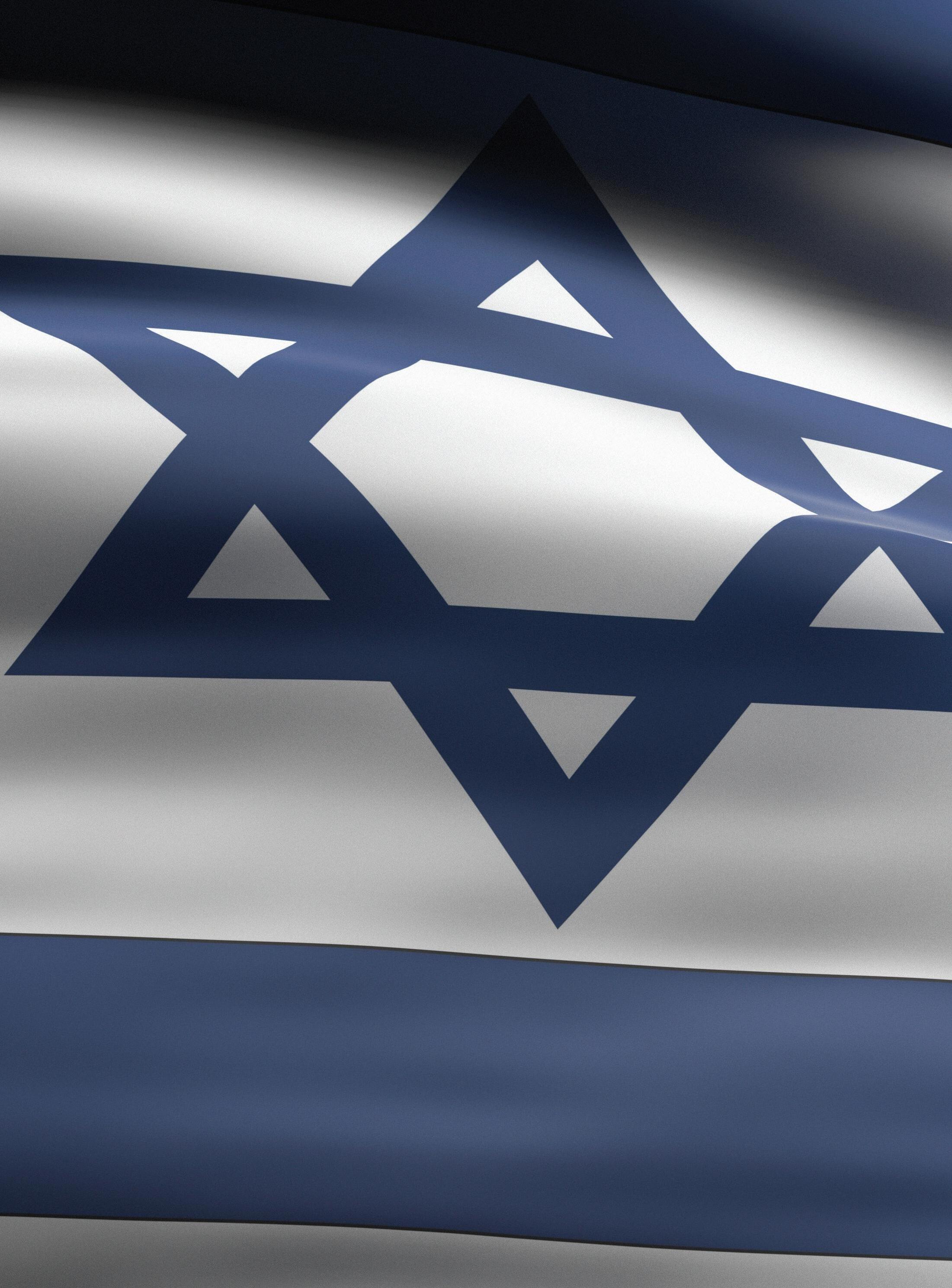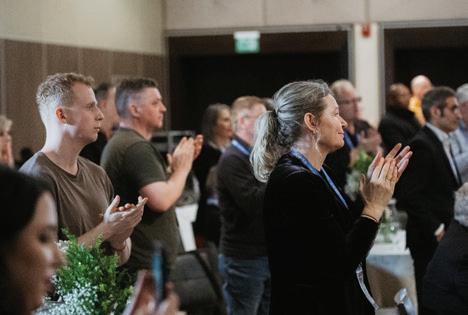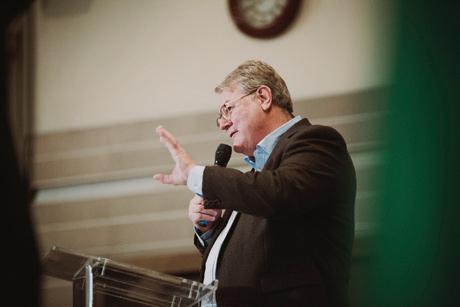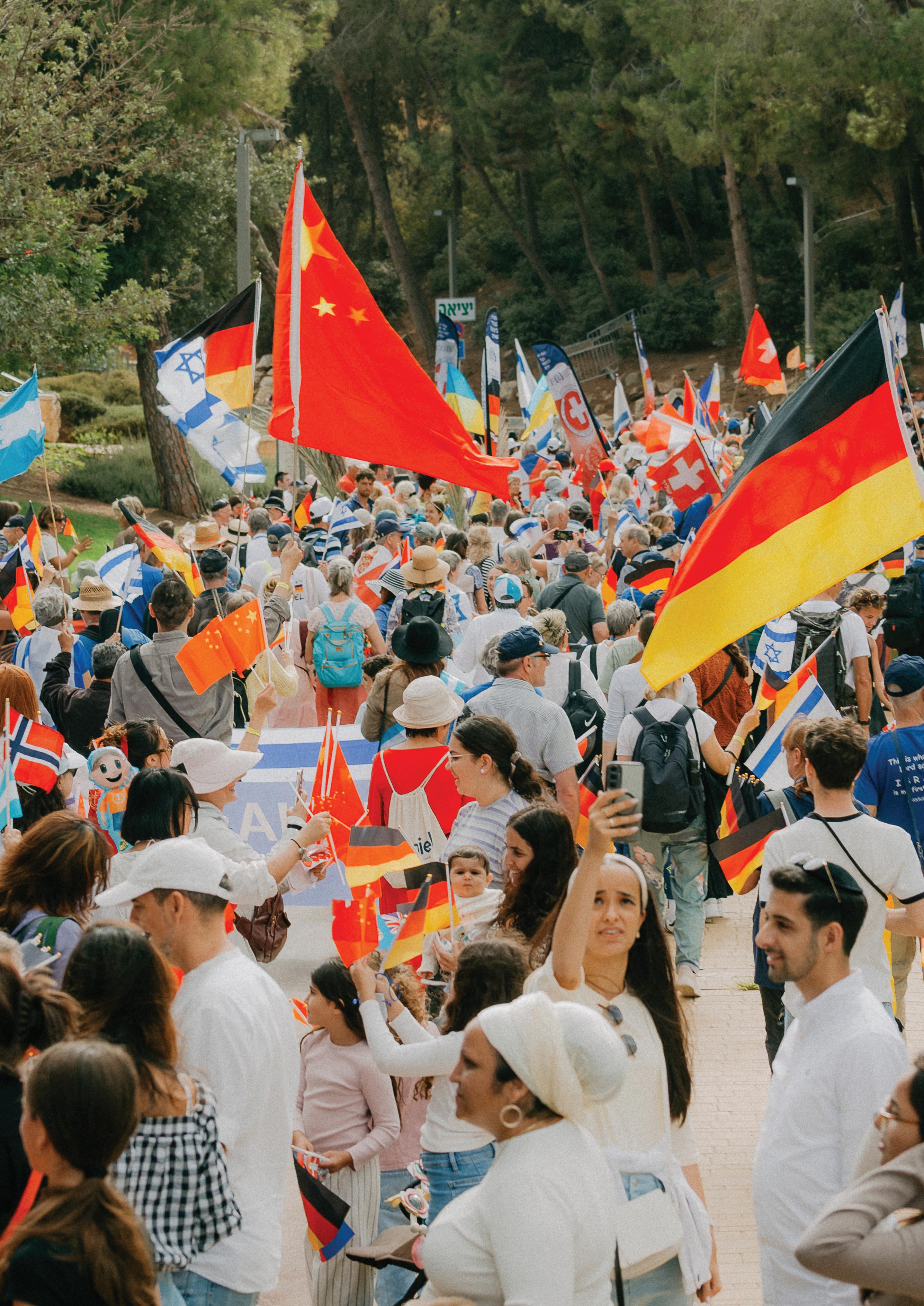

THE NATIONS GATHER IN ZION

The International Christian Embassy Jerusalem was established in 1980 in recognition of the biblical significance of Jerusalem and its unique connection to the Jewish people. Today the ICEJ represents millions of Christians, churches and denominations to the nation and people of Israel. We recognise in the restoration of Israel the faithfulness of God to keep His ancient covenant with the Jewish people. Our main objectives are:
* To stand with Israel in support and friendship;
* To equip and teach the worldwide Church regarding God’s purposes with Israel and the nations of the Middle East;
* To be an active voice of reconciliation between Jews, Christians and Arabs and to support the churches and congregations in the Holy Land.
From its head offices in Jerusalem, the ICEJ reaches out to more than 170 countries, with branch offices in over 90 nations.
Our vision is:
* To reach every segment of Israeli society with a Christian testimony of comfort and love, and
* To reach and actively represent to Israel the support of denominations, churches and believers from every nation on earth.
The Christian Embassy is a non-denominational faith-based ministry supported by the voluntary contributions of our members and friends across the globe. We invite you to join with us as we minister to Israel and the Jewish people worldwide by donating to the ongoing work and witness of the ICEJ.
WORD
FROM JERUSALEM CREDITS
ICEJ President Dr. Jürgen Bühler
Senior Vice President David Parsons
VP International Affairs Mojmir Kallus
VP Finance David Van der Walt
VP Operations Richard van der Beek
VP AID & Aliyah Nicole Yoder
Managing Editor/Publications Director Laurina Driesse
Staff Writers Nativia Bühler, Jon Simmons, Naomi Ammon
Additional Writers Maxine Carlill, Pastor Firmin, Howard Flower
Graphic Design/Illustrator Ryan Tsuen
Administration Jonathan Buker
Photography Adobe Stock, Shutterstock, Flash 90, President’s Office, JAFI, AP-Images, Adobe Firefly, Wikimedia Commons, ICEJ Staff and Branches
The New King James Bible is used for all Bible references unless otherwise noted.
Word From Jerusalem is published by the International Christian Embassy Jerusalem. Reproduction in whole or in part without written permission is prohibited. Word From Jerusalem has no subscription price and is supported through contributions worldwide. All gifts to this ministry are tax-deductible (in countries where this applies). For more information, visit us at www.icej.org
INTERNATIONAL CHRISTIAN EMBASSY JERUSALEM
P.O. Box 1192, Jerusalem • 9101002, ISRAEL
Support our ministry online at www.icej.org
Dear friends,

This year’s Feast of Tabernacles will always remain unforgettable for us. Two years ago, the very day after our Feast celebration ended, on Simchat Torah, the horrific terror invasion by Hamas on Israel took place. More than 250 hostages were taken by Hamas. That same day nearly 1,200 people were killed, and over the past two years the toll in lives among Israeli civilians and soldiers has reached over 2,000. In 2023, many of our Feast groups were still in the country and experienced the constant rocket alarms that shook the whole nation.
This year again, exactly on Simchat Torah, the war came to a standstill and the last remaining 20 living hostages were released in one day. Many of our pilgrim groups were still touring in Israel and some even extended their stay just to experience this historic moment with the nation. It was not only a day of unspeakable joy for Israel, as two years of hardship came to an end, it was also a day of thankfulness as thousands of believers from around the world had been praying with us for victory over Hamas, for peace, and for the release of the hostages. God is a prayer answering-God and we could see it first-hand during Sukkot
As always, the presence of God was tangibly with us. The Feast of Tabernacles is always a season when God shows up. For many repeat pilgrims, it always feels like “the best Feast ever.” When we hear it, we know it is not that we organised it better than last year, but that God was present in our midst once again in a fresh new way. People were called to ministry, healed, heard the voice of God, or were just touched by His presence during the worship and sharing of the Word.
In the days after the Feast, my wife and I had the privilege to visit several communities in the Gaza border area. What struck me again was the incredible resilience of the people of Israel. I had to marvel about the many cars on the roads in this desert area adjacent to the Gaza Strip. One of the local leaders explained that the whole region has become a hub of new construction and expansion since October 7. I saw with my own eyes that Israel is not only rebuilding what was destroyed, but the area is experiencing a new and unexpected economic boom. The future of these communities will be stronger than they were before. And as the ICEJ, we have the privilege to be part of this amazing development.
Please make plans to be with us at the next Feast of Tabernacles. It will be from September 25 to October 2, 2026. The theme is “The Lord roars from Zion”, from Joel 3:16. We expect that God will make His voice heard in a powerful way among us. I look forward to seeing you there.
Thank you for your support and prayers! May the Lord bless you richly as you read this magazine.
Yours in Christ,

Dr. Jürgen Bühler ICEJ President
COVER PHOTO: Feast pilgrims with their national flags line the pathway at Sacher Park in Jerusalem during the popular Jerusalem March at the Feast of Tabernacles 2025.



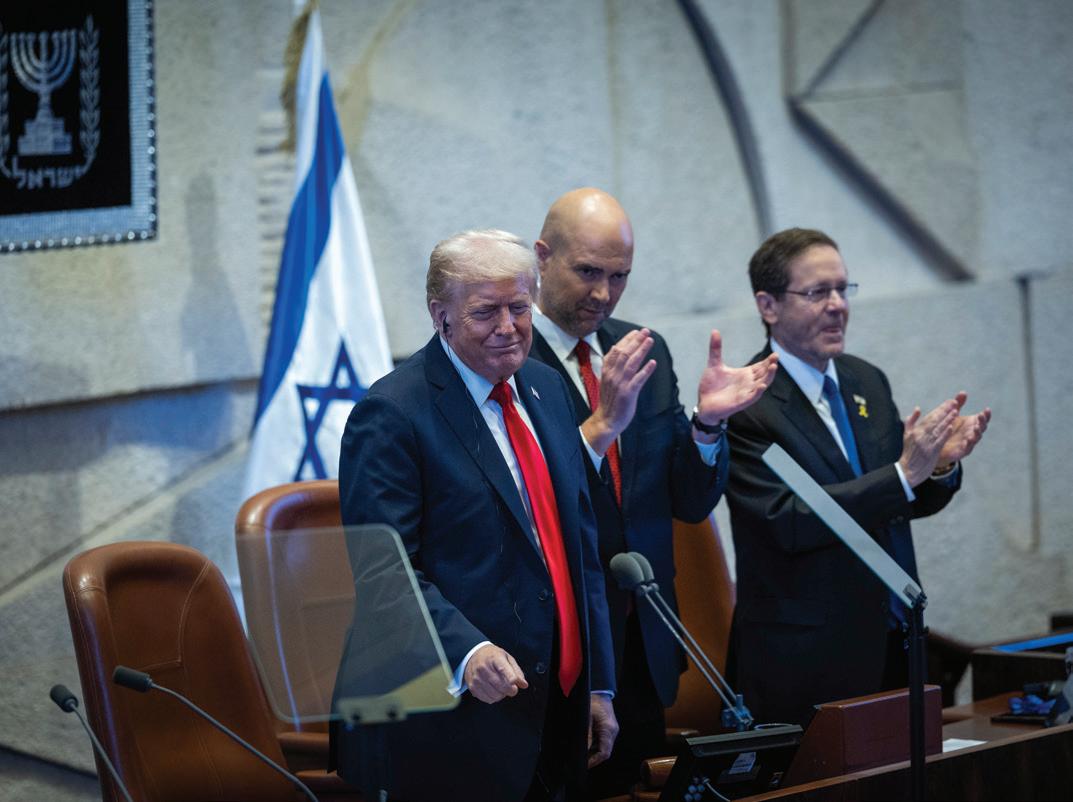
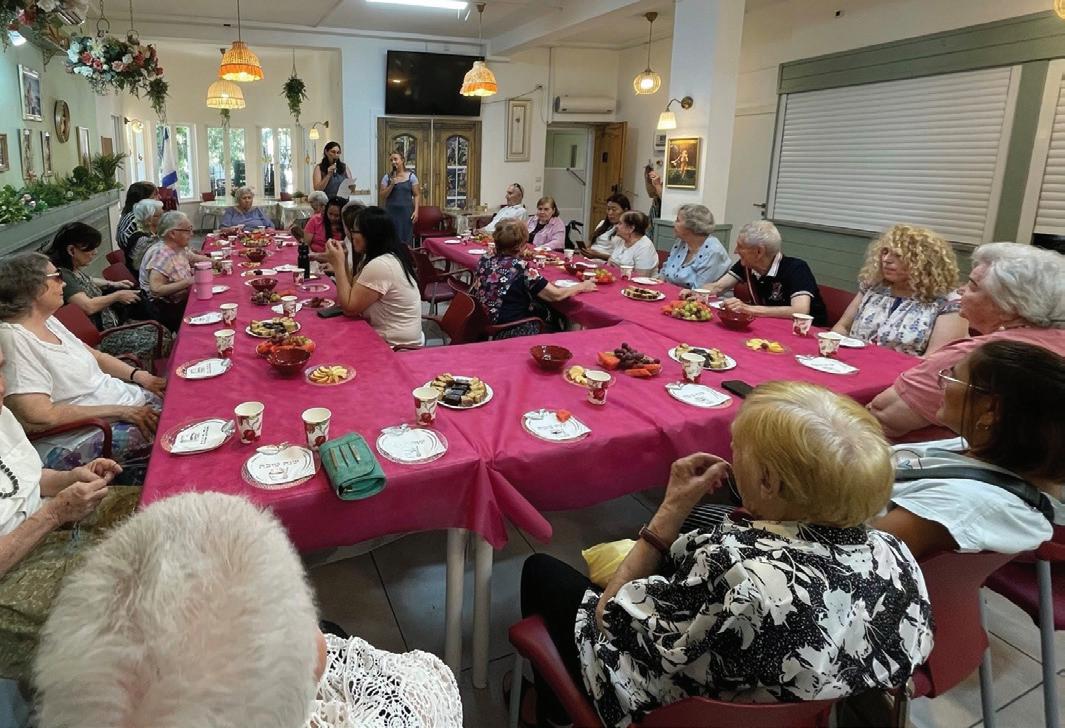
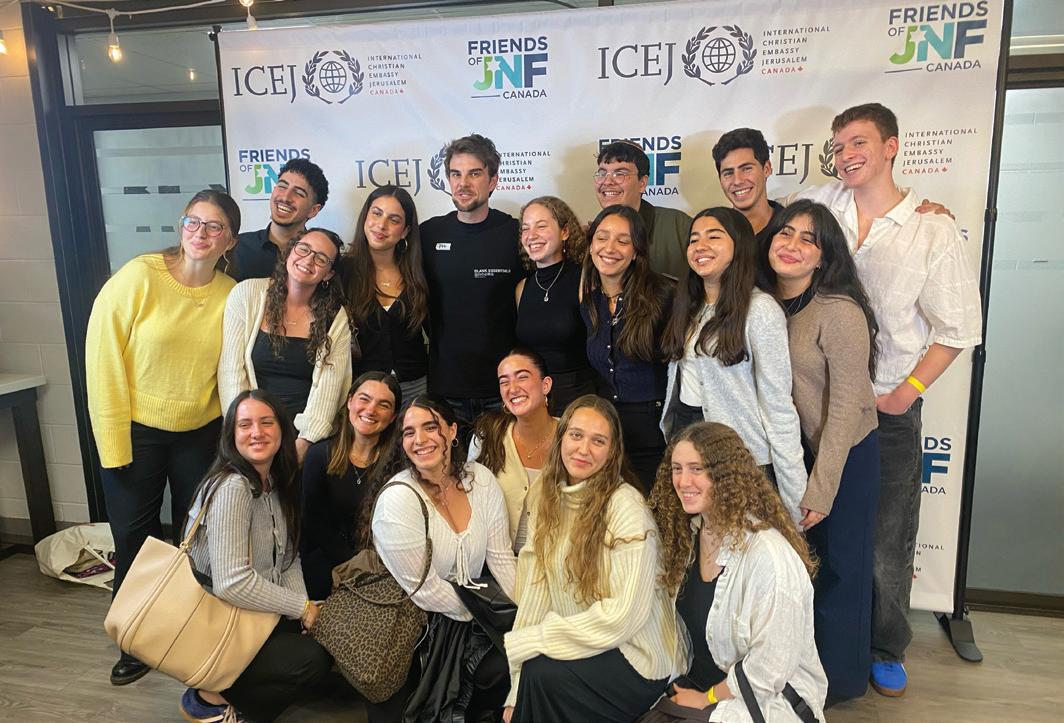
An aerial panoramic photo of the city of Be’er Sheva, the largest city in Israel’s Negev desert.

TTEN PRINCIPLES for ISRAEL’S RESTORATION
BY DR. JÜRGEN BÜHLER, ICEJ PRESIDENT
his year’s Feast theme came from Zechariah 8:23, that “ten men from every language of the nations shall grasp the sleeve of a Jewish man…”
It is the last, climactic verse of this chapter, in which God makes ten declarations about Israel’s future restoration, each starting: “Thus says the Lord”. During this year’s Feast, the Gaza war halted and the last living hostages came home. In parallel, US President Donald Trump released a 20-point plan for Gaza’s future. Yet God’s ten decrees over Israel are a timely, heavenly reminder that He is King of all the earth. Men have their plans, but God’s divine imperatives for Israel and the nations will prevail.
1God is emotionally involved in Israel’s restoration: “Thus says the Lord of hosts: I am jealous for Zion with great jealousy… with great wrath.” (Zechariah 8:2 – ESV passim) God wants us to know He is emotionally attached to Israel’s restoration with great jealousy and anger. The Oxford Dictionary defines jealousy as “fiercely protective of one’s rights or possessions”. Often, God declares the Land of Israel is His possession (e.g., Leviticus 25:23). As owner, He gave it to the Jewish people as an
eternal inheritance (Genesis 17:8; Joshua 14:9; Ezekiel 37:25).
Today, God watches jealously when nations like Iran call for Israel’s destruction. He also watches jealously at the nations coming against Israel in the United Nations or European Union, trying to dictate Israel’s sovereign borders. Our world is strangely obsessed with solving the ‘Israel Question,’ while far greater conflicts and humanitarian crises are ignored. Israel is a vibrant democracy, yet it is condemned far more than any other country. The past ten years alone, 173 UN resolutions condemned Israel, compared to just ten resolutions against rogue nations like Iran and North Korea.
God says He is jealous for Zion with hot anger. This is a call to pray for your nation! It also raises the question: If God’s heart is so deeply involved with Israel, how am I doing? Do I feel the same passion and zeal for Zion? If not, ask God to show you His heart for Israel.
2The Lord will set up His habitation in Zion: “Thus says the Lord: I have returned to Zion and will dwell in the midst of Jerusalem…” (Zechariah 8:3) This declaration further explains why God is jealous
for Zion – it will again be His dwelling place.” He has returned (past tense) like a landlord who comes to a place He owns. He oversees the daily work of the architects, contractors and interior designers, until the day He will finally move in. Zechariah recalls how God’s holy presence left Jerusalem during the time of Ezekiel. It was a phased departure from the Holy of Holies, then the outer courts, and finally the city. But God declares He is now returning to once again make Jerusalem His dwelling place.
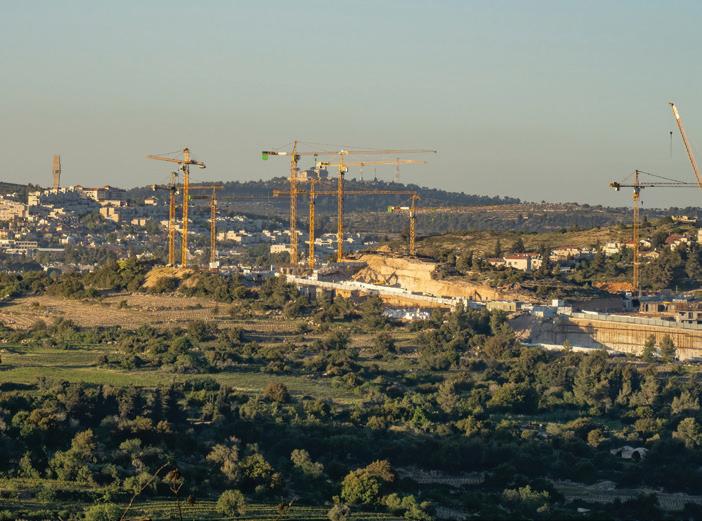
Construction cranes tower over the town of Mevaseret Zion near Jerusalem.
The Lord indeed has returned to Jerusalem. His attention is on it, as He prepares the city to be His resting place on earth. This work can be seen everywhere, and God invites us to be part of it.

3
It is multi-generational: “Thus says the Lord of hosts: Old men and old women shall again sit in the streets of Jerusalem, each with staff in hand because of great age.’” (Zechariah 8:4) The restoration of Israel will impact all segments of the Jewish people, both young and old, men and women. I will never forget my first visit to Israel 34 years ago. We visited the 19th century Rothschild House in the Old City, which today houses a yeshiva. On the sidewalk was inscribed the above passage from Zechariah 8:4. As I watched, young kids ran excitedly across the square and old men sat on chairs talking, I was thrilled to see prophecy being fulfilled.
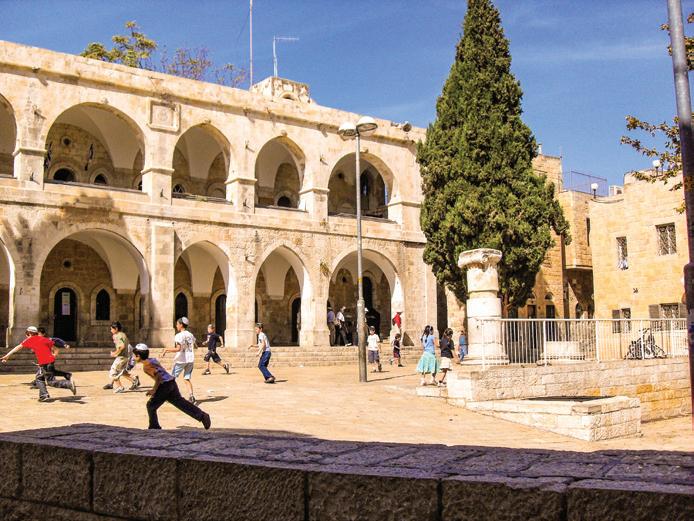
4
It is Miraculous: “This is what the Lord Almighty says: “It may seem marvelous to this people…” (Zechariah 8:6 – NIV) The restoration of Israel is a miracle; in fact a collection of miracles. Consider just one example. Israel is the only country whose borders can be seen from space – not due to geographic features like rivers or mountains, but due to the greening of the desert compared to Egypt. God commands Ezekiel to prophesy to the Land of Israel to bring forth vegetation (Ezekiel 36), and you can even see it from space.
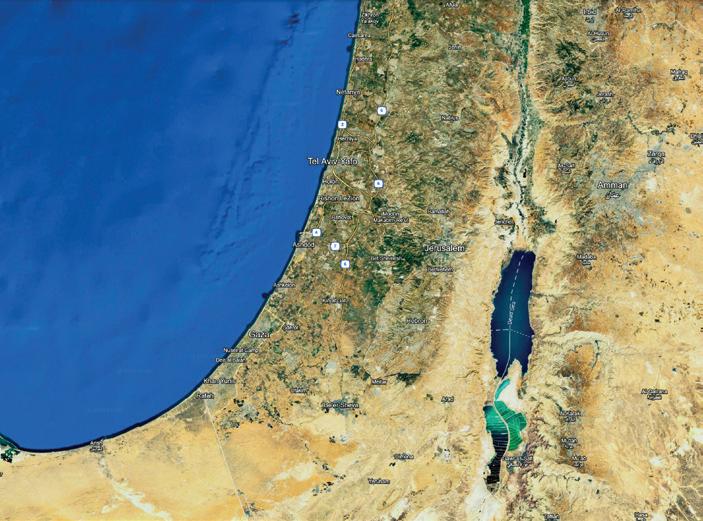
5
The miracle of Aliyah: “Thus says the Lord of hosts: Behold, I will save My people from the east country and from the west country…” (Zechariah 8:7). Another great
miracle is Aliyah – the Jewish return to Israel. I learned something amazing in a recent conversation with a Jewish Agency official. Since October 7, 2023, the number of Jews registering interest in moving to Israel doubled. Israel is probably the only country in the world where people immigrate even amid conflict.
6
A new season for Israel: “Thus says the Lord of hosts: …But now I will not treat the remnant of this people as in the former days… just as you were a curse among the nations, O house of Judah and house of Israel, so I will save you, and you shall be a blessing.” (Zechariah 8:11-13) Here, God prophesies a new season for Israel, from being a “curse” to becoming a “blessing”. The Jewish people today indeed have seen a dramatic shift from being a persecuted underdog and a byword among the nations, to being a world leader in science, technology, medicine and agriculture. It is an irreversible, heavenly shift seen by all.
7
A new divine approach: “For thus says the Lord of hosts: Just as I determined to punish you when your fathers provoked Me to wrath, and I would not relent, so again in these days I am determined to do good to Jerusalem and to the house of Judah.” (Zechariah 8:14ff) God declares He is changing His attitude towards Israel. This is of highest importance for us, as it means we need a new approach to understand God’s current dealings with Israel. God was determined to deal harshly with His people, as was evident over many centuries. Yet, God has now reversed His way of dealing with Israel. Practically, this means their time of dispersion is over and we are in a time of ingathering. Israel has gone from desolation to restoration. It also means the “times of the Gentiles” is closing and Jerusalem is rightly returning to Jewish hands (Luke 21:24). It is thus time to fix our sight on what God is doing in Israel. As the Psalmist declares: “The time to favour Zion has come!” (Psalm 102:13)
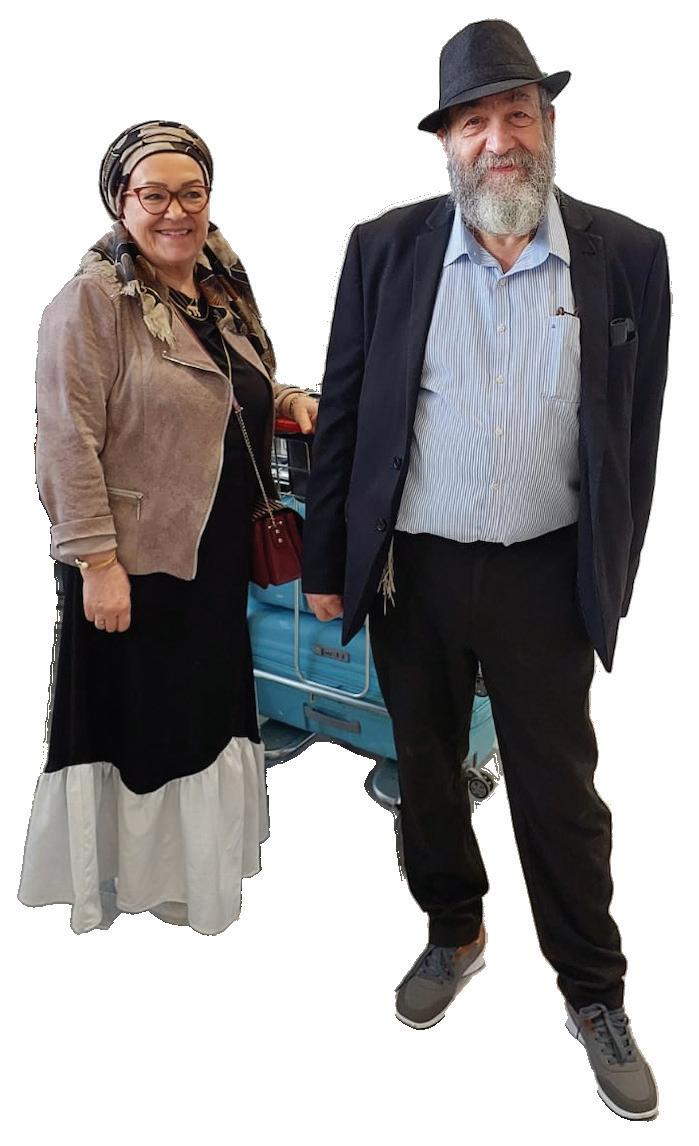
8From mourning to joy: “Thus says the Lord of hosts: The fast of the fourth month... fifth… seventh… and tenth, shall be joy and gladness and cheerful feasts for the house of Judah.” (Zechariah 8:19) This passage reminds us that we are still in a time of transition from one season to another. Israel today still mourns not only the pain of the Holocaust, but also the current wounds of war. We just saw this when the last living hostages were released
by Hamas, as Israelis rejoiced but also mourned some 2000 civilians and soldiers killed since October 7. Yet God promises a day will come when their mourning will turn to “gladness” (Isaiah 35:10, 61:3).
9
Mass pilgrimage to Zion: “Thus says the Lord of hosts: ‘Peoples shall yet come, inhabitants of many cities; The inhabitants of one city shall go to another, saying “Let us continue to go and pray before the Lord, and seek the Lord of hosts. I myself will go also.”’” (Zechariah 8:20-22) The Lord decrees a season of mass Gentile pilgrimage to Jerusalem. Some see this as a purely futuristic prophecy, but we see it coming to pass already. Just days after our Feast, a Samoan lady testified how young people from her island are selling cars and possessions just to come to the Feast of Tabernacles to meet God next year.
Pilgrims line the walkway at Sacher Park at the Feast of Tabernacles 2025.

In a way, this Feast is exactly as theologian George Eldon Ladd once described the Kingdom of God, as a manifestation of “the presence of the future”. Indeed, we are already tasting “the powers of the age to come”. (Hebrews 6:5) 10
A transformed nation: “Thus says the Lord of hosts: ‘In those days ten men from every language of the nations shall grasp the sleeve of a Jewish man, saying, “Let us go with you, for we have heard that God is with you.”’” (Zechariah 8:23) This verse represents the culmination of God’s purposes with Israel, to transform them into a nation that will amaze the world. The Hebrew prophets foresaw a time when the people of Israel will receive new hearts transformed by the Holy Spirit (Ezekiel 36:2527). As this happens, Israel will become a magnet not just for believers but for everyone, even kings and rulers. Israel will be a shining light to the nations (Isaiah 60:1-3). Paul said it will be like “life from the dead”. (Romans 11:15) And people will follow Israel for the simple reason that “God is with you.”
May this day come soon!
Google Earth shows the greening of Israel’s desert.
Children play outside the House of Rothschild. (Wikimedia Commons)

PASTOR MANASA KOLIVUSO AT KFAR HANOKDIM
The Feast of Tabernacles opened at the Kfar HaNokdim oasis, in the Negev desert, where evangelist Manasa Kolivuso from Fiji gave an inspiring message on living a life of worship towards Jesus. Pastor Manasa, the new interim chairman of the ICEJ-Fiji branch, encouraged the pilgrims to always remember the purpose for coming to Jerusalem for Tabernacles, which can be found in the Feast theme passage of Zechariah 8:20-23.
“The purpose we have ascended to Jerusalem for the Feast of Tabernacles 2025 is to seek
FEAST HIGHLIGHTS PRESIDENT ISAAC HERZOG ON ISRAELI GUEST NIGHT
Israel’s President Isaac Herzog made a riveting appearaance on Israeli Guest Night, delivering a warm welcome address to the Feast pilgrims and thanking Christians worldwide for standing with the Jewish nation and people during these past two turbulent years.
“It is no coincidence, friends, that you have gathered here at a decisive moment in the history of this region. You, lovers of Zion, have arrived here at a crossroads in which the choice for blessing or curse, for life and liberty or death and destruction, is laid out before us,” said Herzog. “Of course, your love for Israel is not new. For decades, your Embassy in Jerusalem, the ICEJ, has been a global voice of Christian friendship, solidarity and action for Israel. When others left Jerusalem, you came and said, like Abraham: ‘Hineini, we are here. We stand with the State of Israel, with the people of Israel, and with the Holy City.’”
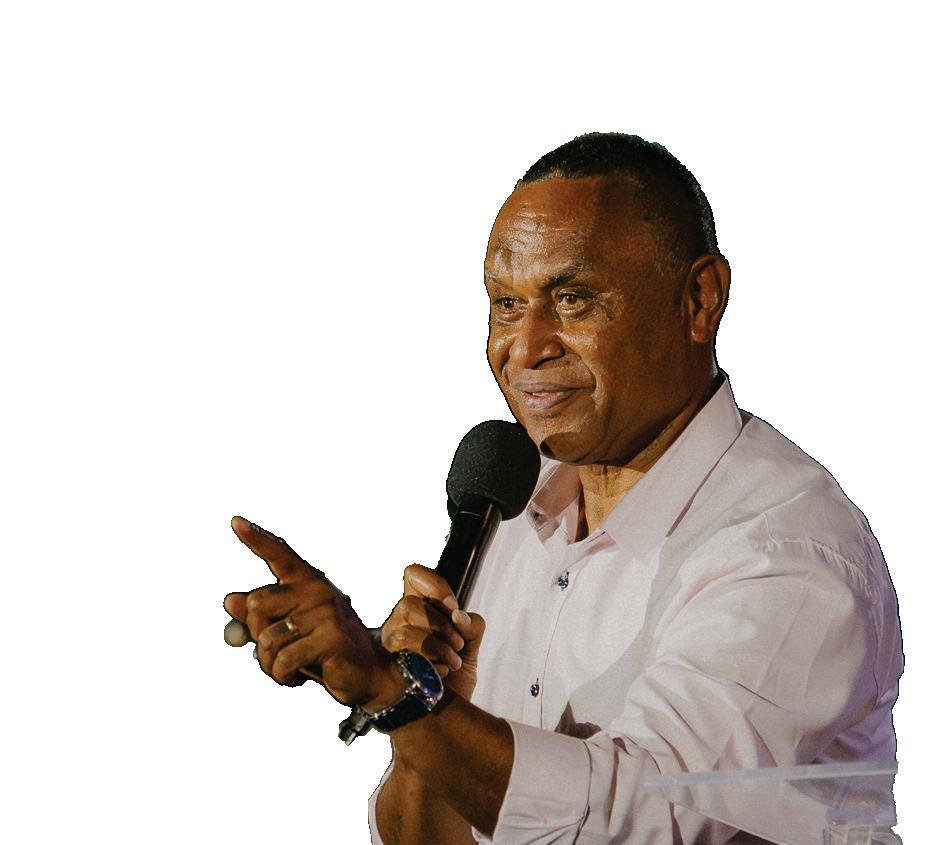
the Lord”, he said. “Time spent in seeking God is never a time wasted; it is always a time invested… Everything else can wait. Food can wait. Rest can wait. Worship cannot wait. We are called to the Feast of Sukkot to have an encounter with God.”
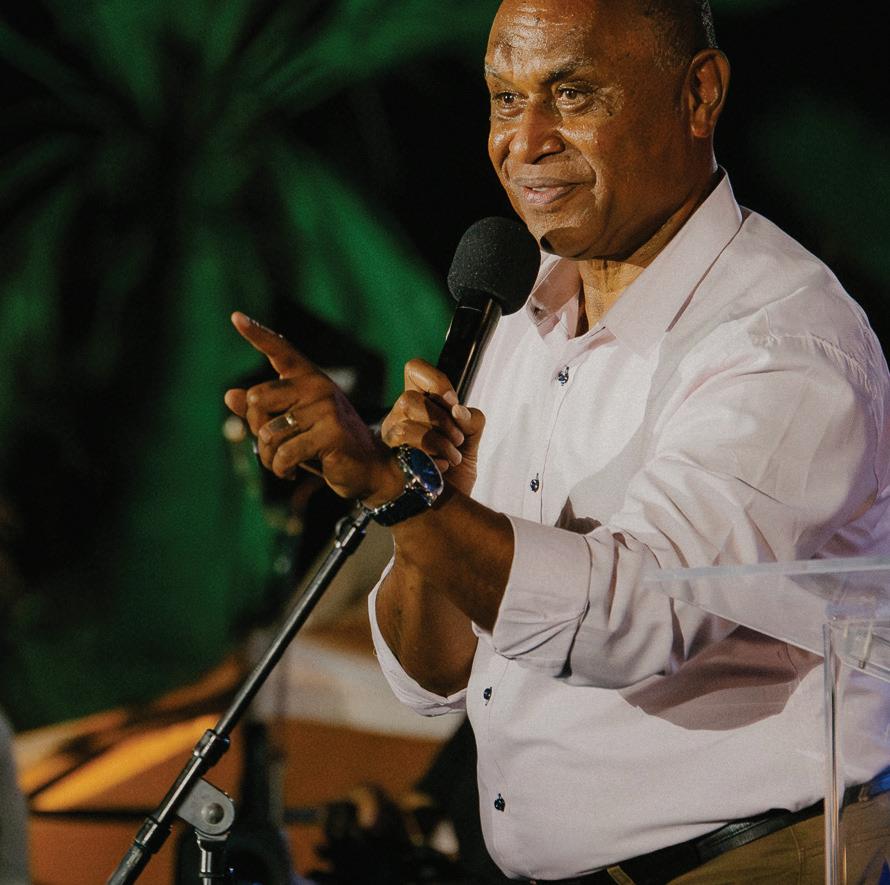
Pastor Manasa Kolivuso brings the main message on opening night at Kfar HaNokdim.
“The world can reject Israel today, but one day they will come running back. And from every nation, people will join hands and cling
“I want to thank the ICEJ, its president, Dr. Jürgen Bühler, and his excellent team. And Christian Zionist communities around the world. And I want to thank each of you who have made this pilgrimage of body, heart and spirit to Israel. And those joining us now from around the world”, Herzog added.
“May God bless you for blessing Israel. May He bless Jerusalem. May He bring our hostages home as soon as possible. And may He spread His tabernacle, His canopy, His sukkah of peace, over all who love this land. Thank you.”
to the robe of a Jew… [We need to] cling to the robe of the One Jew. If we miss that One Jew, Jesus, we miss it all.”
Pastor Manasa also led the entire assembly in fervent prayer for the safe return of all the Israeli hostages still held in Gaza before the Feast ended the following week. Amazingly, our prayers were answered when the last 20 living hostages came home on the very last day of Sukkot
FIJI’S DPM VILIAME GAVOKA ATTENDS FEAST
The Deputy Prime Minister of Fiji, Viliame Gavoka, came to Jerusalem as a Feast pilgrim just weeks after his nation opened its new Embassy in Jerusalem, the seventh nation to do so. Gavoka was the key figure who insisted on the Embassy opening as a condition for joining the new government last year. “Fijians know that God is with Israel”, he told the Feast gathering. “For decades, Christians in Fiji have longed to see our government stand in Jerusalem—the eternal capital of Israel… Fiji is small but growing in Spirit. We stand unashamedly with Israel and unshakably upon the Word of God. We are a people guided by faith, a people of prayer, and a nation that stands with God’s Word.”


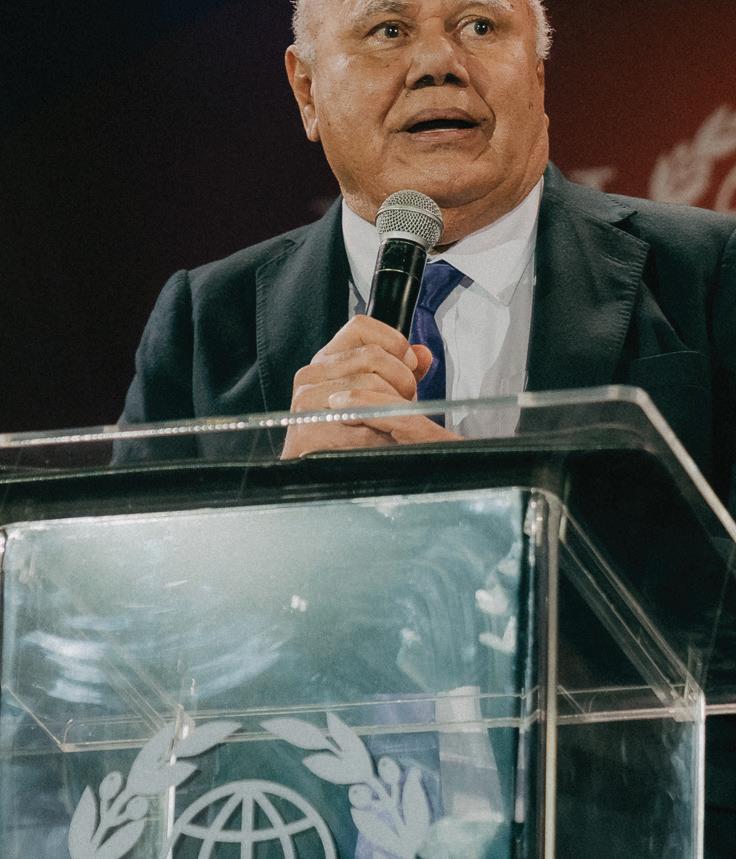



MALCOLM HEDDING RECEIVES NEHEMIAH AWARD
During the Feast, ICEJ President Dr. Jürgen Bühler presented this year’s Nehemiah Award to his predecessor, former ICEJ Executive Director Rev. Malcolm Hedding, in recognition of his lifetime of achievements in building Christian support for Israel. Hedding first served as chaplain for the Christian Embassy beginning in the 1980s and later came back from South Africa to head the ministry from 2000 to 2011. He remained on the International Board of Trustees and was an international speaker for the ICEJ until last year.
“I can say that in all my fifty years of activism and ministry on behalf of the Jewish community in the world and the nation of Israel, I have simply strived to be faithful to the call of God over my life,” Hedding told the audience. “I do understand that faithfulness leads to significance. This award gives me that sense of joy that in some way my life has been significant for the Jewish community and for the nation of Israel.”
OVER 2000 CHRISTIANS JOIN JERUSALEM MARCH
The Christian Embassy arranged to hold the traditional Jerusalem March during the Feast this year in Sacher Park, where over 2,000 pro-Israel Christians from some 75 countries paraded with their national flags and engaged with the thousands of Israelis gathered there for Sukkot holiday activities. This year’s Feast gathering constituted the largest solidarity mission to Israel since the war began two years ago. The March came just hours after news broke overnight that Israel and Hamas had agreed on the first phase of US President Trump’s plan for ending the war in Gaza and releasing the remaining Israeli hostages. The American pilgrims were especially cheered at this year’s
TIMELY


Rev. Malcolm Hedding receives the Nehemiah Award at this year’s Feast of Tabernacles
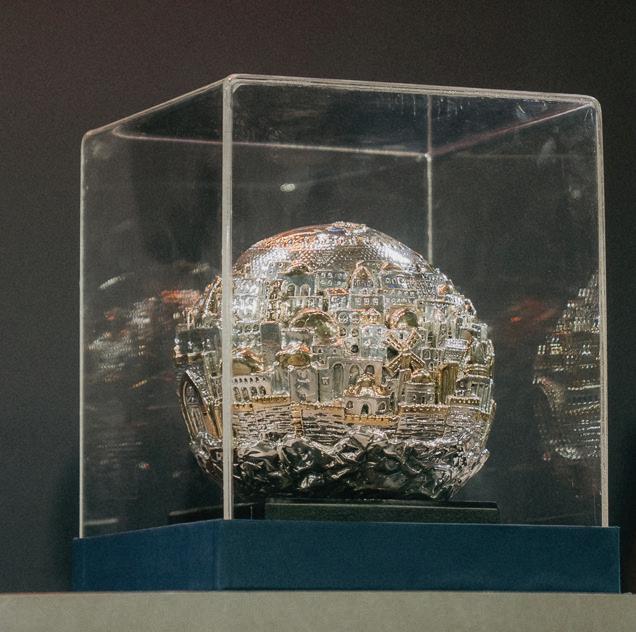
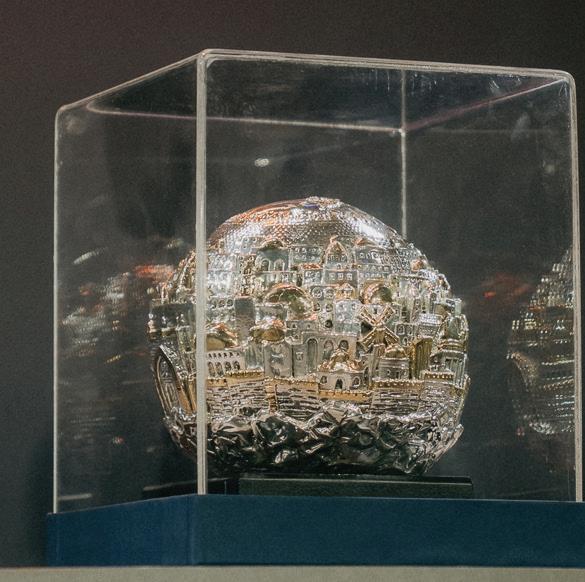

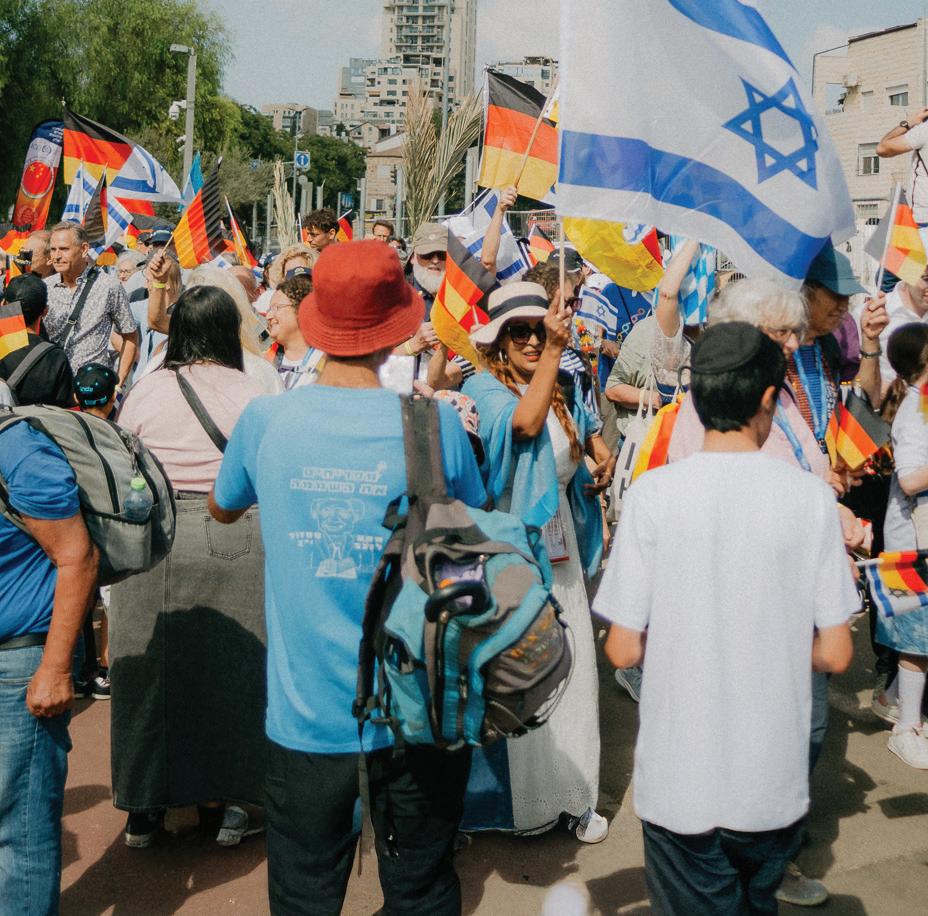
March due to Trump’s lead role in freeing the Israeli hostages.
PRAYERS FOR ISRAELI LEADERS IN KNESSET ROSE GARDEN

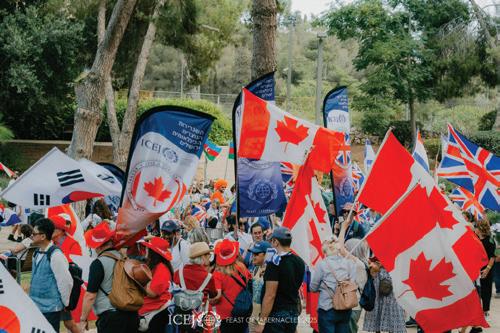

The Jerusalem March ended with a Prayer Vigil in the Rose Garden overlooking the Knesset, where over 2,000 Christians from around the globe zealously interceded for the hostages only a few hundred meters away from where the Israeli cabinet was convening in the Prime Minister’s Office to consider and approve the first phase of the
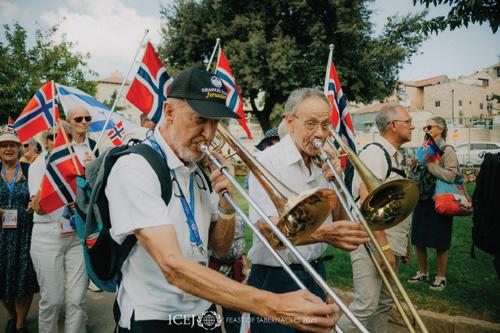

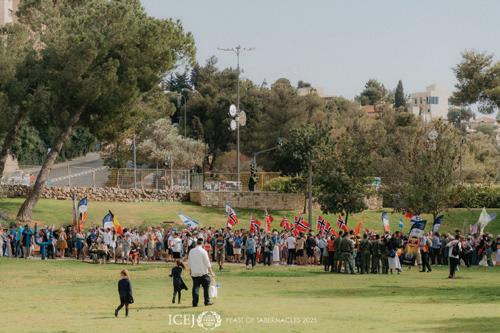
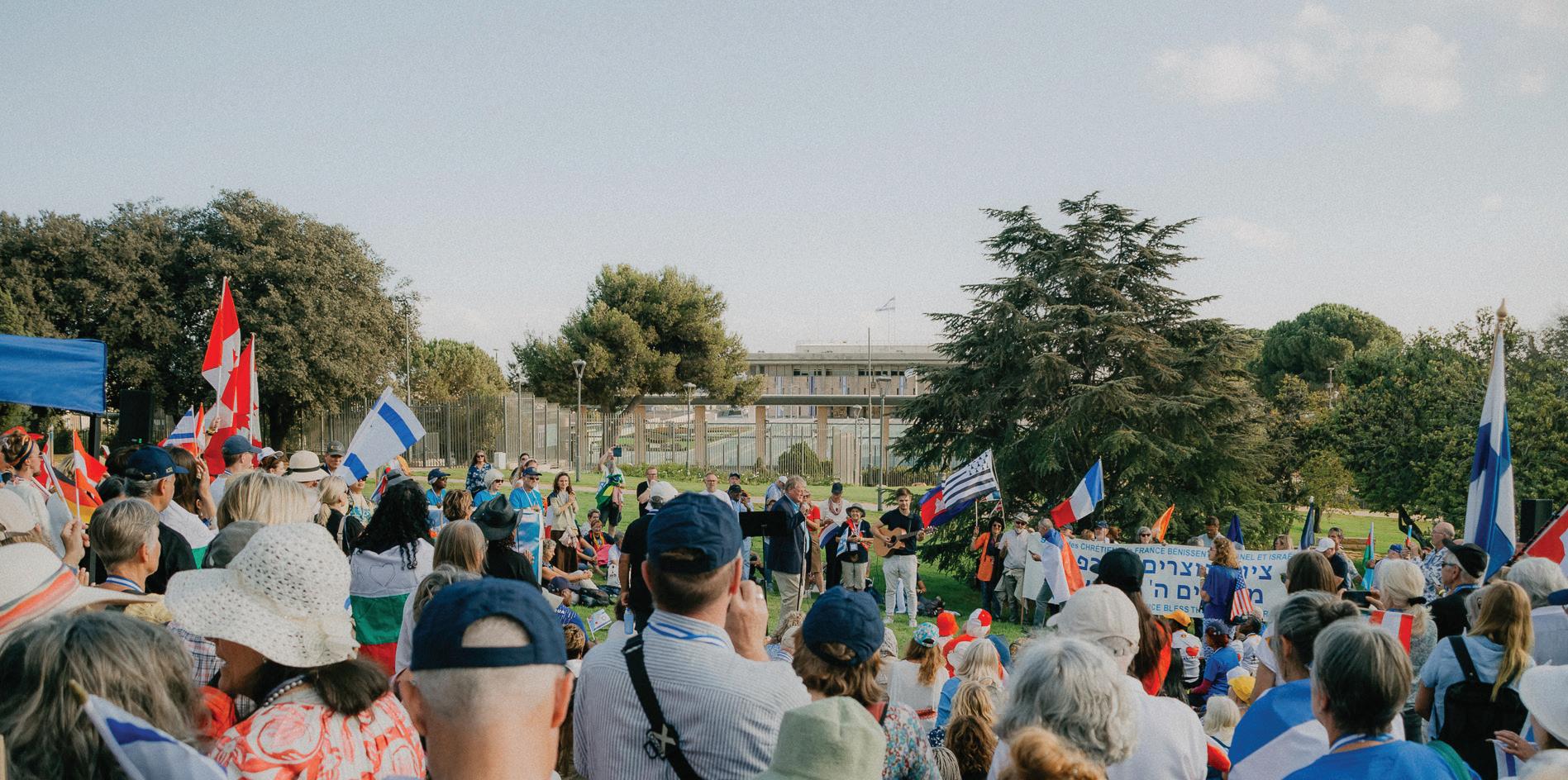
Trump peace plan for Gaza. Within four days, all 20 living hostages still left in Gaza were released to return to their homes and families, a joyous moment that Israelis will never forget.
Pilgrims of this year’s Feast pray from the Wohl Rose Garden towards the Israeli Knesset.
REPORTS FROM THE Feast of Tabernacles 2025
BY LAURINA DRIESSE, JON SIMMONS, NAOMI AMMON & DETRI MCGHEE
OPENING REMEMBRANCE CEREMONY


The ICEJ’s Feast of Tabernacles 2025 began with a Remembrance Ceremony at Sapir College, near the Gaza border, in the same arena where Feast 2023 held a solidarity gathering just two days before the October 7 terror invasion. Over 600 Christians from around the globe heard ICEJ President Dr. Jürgen Bühler share about the warm welcome which Ofir Libshtein, mayor of the Sha’ar HaNegev Regional Council, had given two years earlier, less than 48 hours before he was murdered by Hamas terrorists outside his home in Kfar Aza – making him the first named casualty of the conflict.
Ofir’s brother, Doron Libshtein, was on hand to share on how their family tragically lost members from three generations that day. “I stand here two years later, continuing Ofir’s message of faith, a message of love, of courage and of unbreakable belief that light will always overcome darkness,” assured Doron. He also thanked the Christian pilgrims for their support, saying: “Because of your prayers, love and faith, we know we are not alone.”

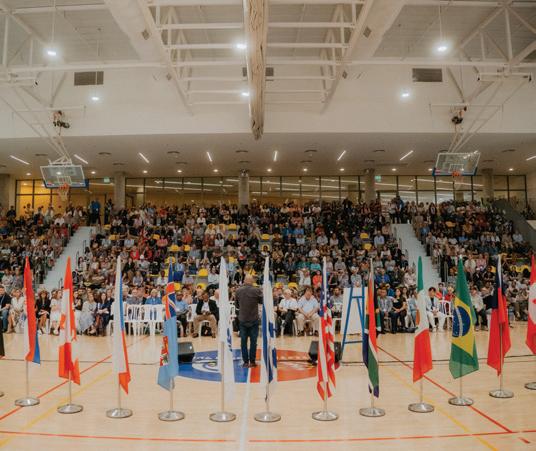
Solidarity Gathering at Sapir College.

ICEJ leaders then presented a donation for a music therapy center in Kfar Aza, one of seven major rebuilding projects the ICEJ is sponsoring across the western Negev, with most focused on trauma care for children and the elderly and strengthening community life.

Presenting a donation for a music therapy centre in Kfar Aza
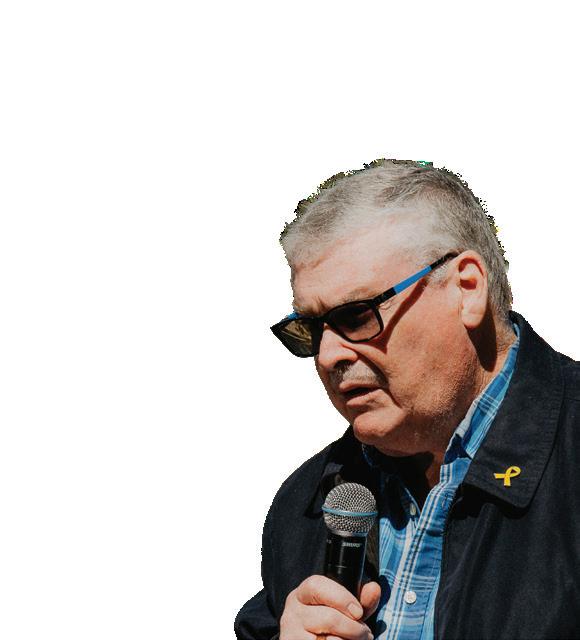
GARDEN TOMB COMMUNION SERVICE
On the second morning of the Feast, pilgrims gathered at the Garden Tomb in Jerusalem for a memorable Communion Service. Israeli musical artist Elihana Elia led an inspiring time of worship and shared about her recent miraculous healing from stage four cancer. Local Jewish pastor Oren Lev Ari and Arab pastor Hanna Eid oversaw Communion and prayed for one another. Rev. Malcolm Hedding then challenged believers to return to their first love: “The heart of Jesus cries out to you today, ‘How much do you love me?’”.

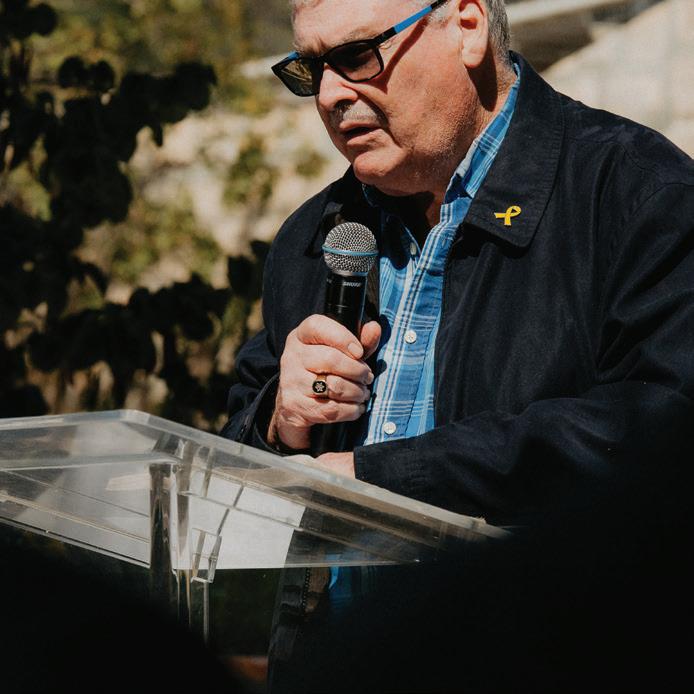
Elihana Elia
MORNING SEMINARS
Seminar teachings and briefings were offered on several mornings by an excellent roster of speakers that included David Parsons, Peter Tsukahira, Daniel Yahav, Israel Pochtar and Hananya Naftali (all from Israel), plus Li Hsieh Tsung (Taiwan), Gerald McDermott (US), and Ramin Parsa (Iran).

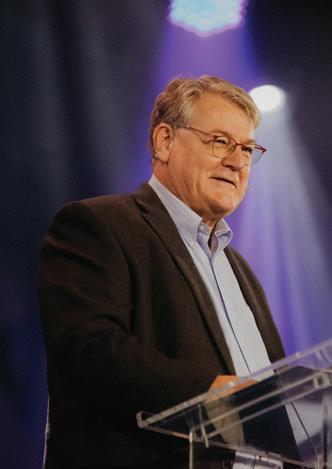

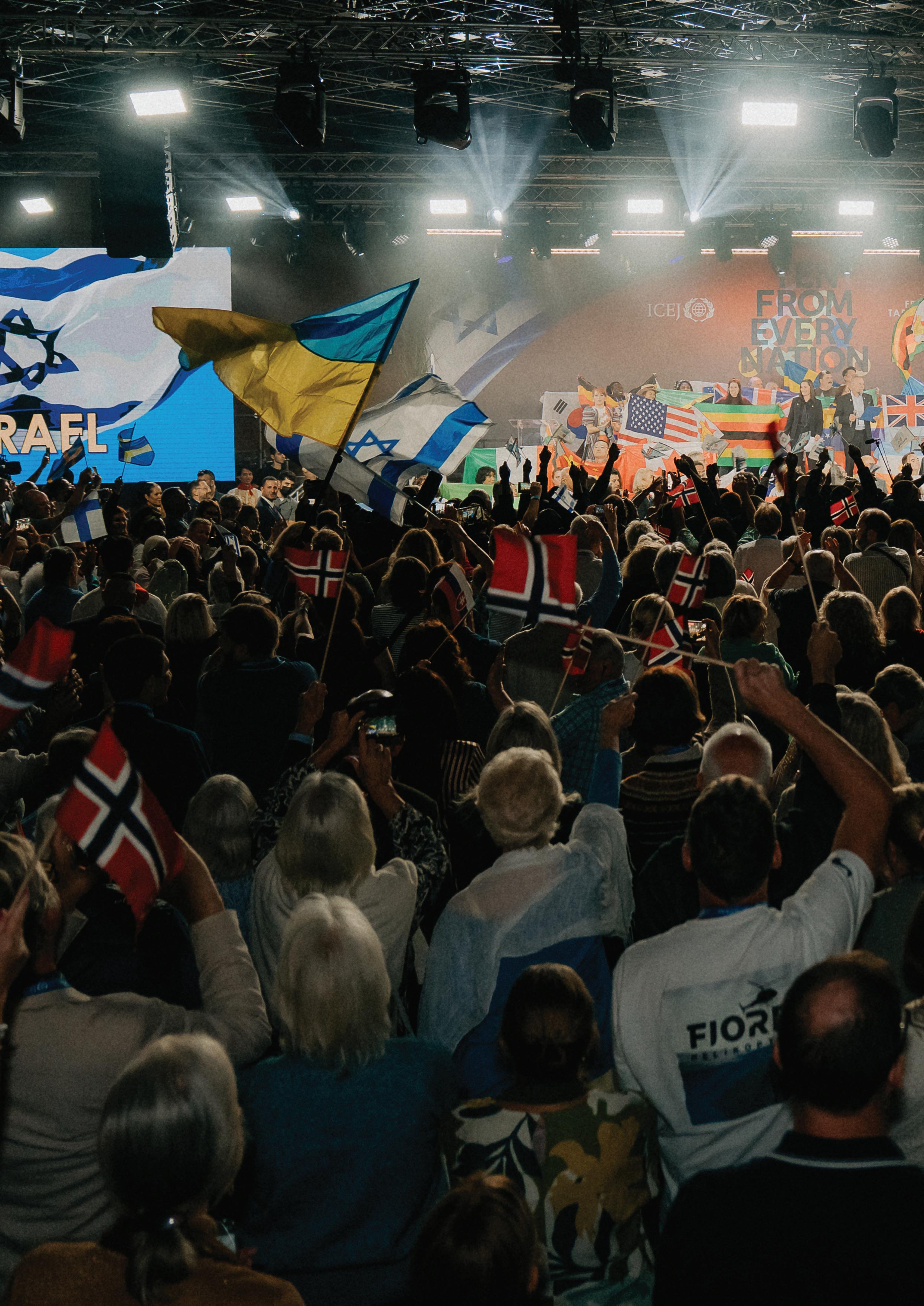
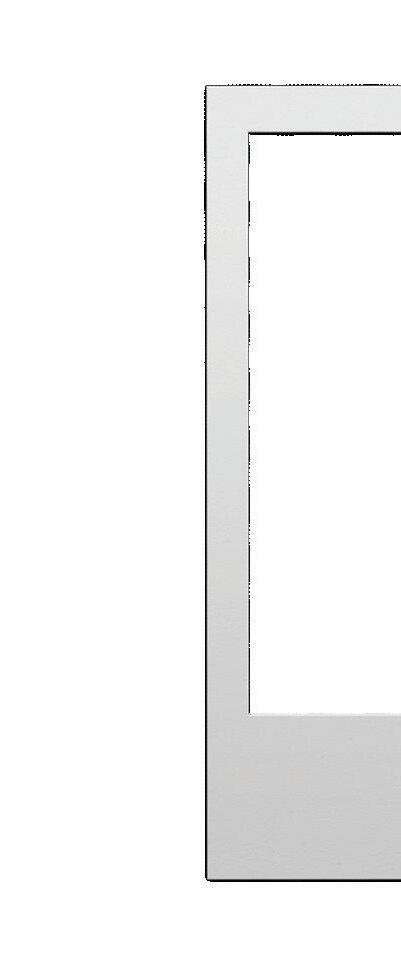
Doron Libshtein
Rev.Malcolm Hedding
David Parsons
FEAST YOUTH NIGHT
On the fourth evening, the focus was Youth Night as Israeli and foreign young adults enjoyed a “Next Generation” celebration. The rousing worship groups included NORTHWORSHIP (Norway), Ana Paula Valadão (Brazil), and SOLU Israel. Mati Shoshani, co-host of TBN’s exciting new online program “Boots on the Ground”, spoke on the spiritual and cultural challenges facing youth, and the opening of an eighth front against Israel in the ongoing media battle. “The war doesn’t end when the ceasefire begins. The battle continues for hearts and minds,” he said, urging prayer and a Biblical foundation for the next generation.

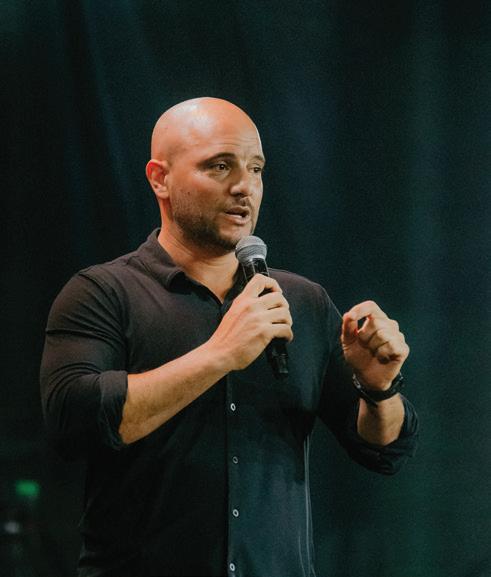

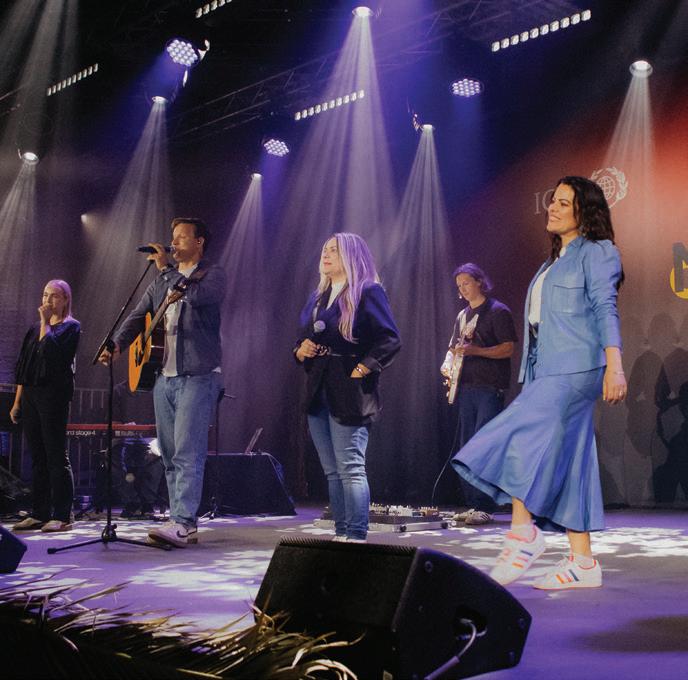

Feast 2025 drew a surprising 1700 registered delegates from some 75 nations, plus over 300 local participants. The top Feast delegations this year came from the USA (over 160), Finland (141), Germany (119), Norway (102), and Brazil (101). There also were strong Christian delegations from several nations which have turned increasingly anti-Israel during the war, including Australia, Canada, France, Ireland, Norway, South Africa and the United Kingdom.
NORTHWORSHIP + Anna Paula Valadão
HEALING SERVICE
Oover Gordon, he simply said to Karen through an interpreter: “Your blood is clean!” When they returned home after the Feast, she had a blood test already scheduled and the doctors were surprised to find her blood was all “clean”.



n the Feast’s final evening, the ICEJ held a healing service led by Pastor Aykhan Mahmudov from Azerbaijan. Among those touched by the Lord that night was Karen Beattie, who serves with her husband Gordon as prayer coordinator for ICEJ-UK and as panellists on the daily Global Prayer Gathering. Karen was born with only one kidney and never had problems from it until recently. But this year she was diagnosed with chronic kidney disease that was getting progressively worse. Over recent months, blood tests, scans, and specialist appointments found her blood platelet levels were very high, which could cause blood clots and lead to a stroke or heart attack. She also had high blood sugar levels that could lead to diabetes, and also high calcium buildup which could affect her bone marrow. It seemed every checkup or blood test found something new wrong. But she came to the Feast and at the Healing Service, she took her husband up for prayer, as he had fallen ill. As Rev. Aykhan prayed





Aykhan Mahmudov
WHAT FEAST PILGRIMS HAD TO SAY:
“I really connected with the Feast theme this year, which emphasised the importance of being part of the true remnant supporting Israel. I felt led to join the pilgrimage to represent the UK, especially due to our government’s recent stance against Israel. God is watching what the nations do with Israel, whether for blessing or cursing, so we want to stand on the right side of blessing.” Annette Powell from the United Kingdom




“I attended the Feast for the first time this year. I had a longing to come here all my life... so I put all my savings into a flight… When I heard first-hand stories of October 7 at the Solidarity gathering, the previously impersonal headlines became specific.” Simonette from Sweden

Trump spoke at a special Knesset session the same day as the last living hostages returned from Gaza (Flash90)
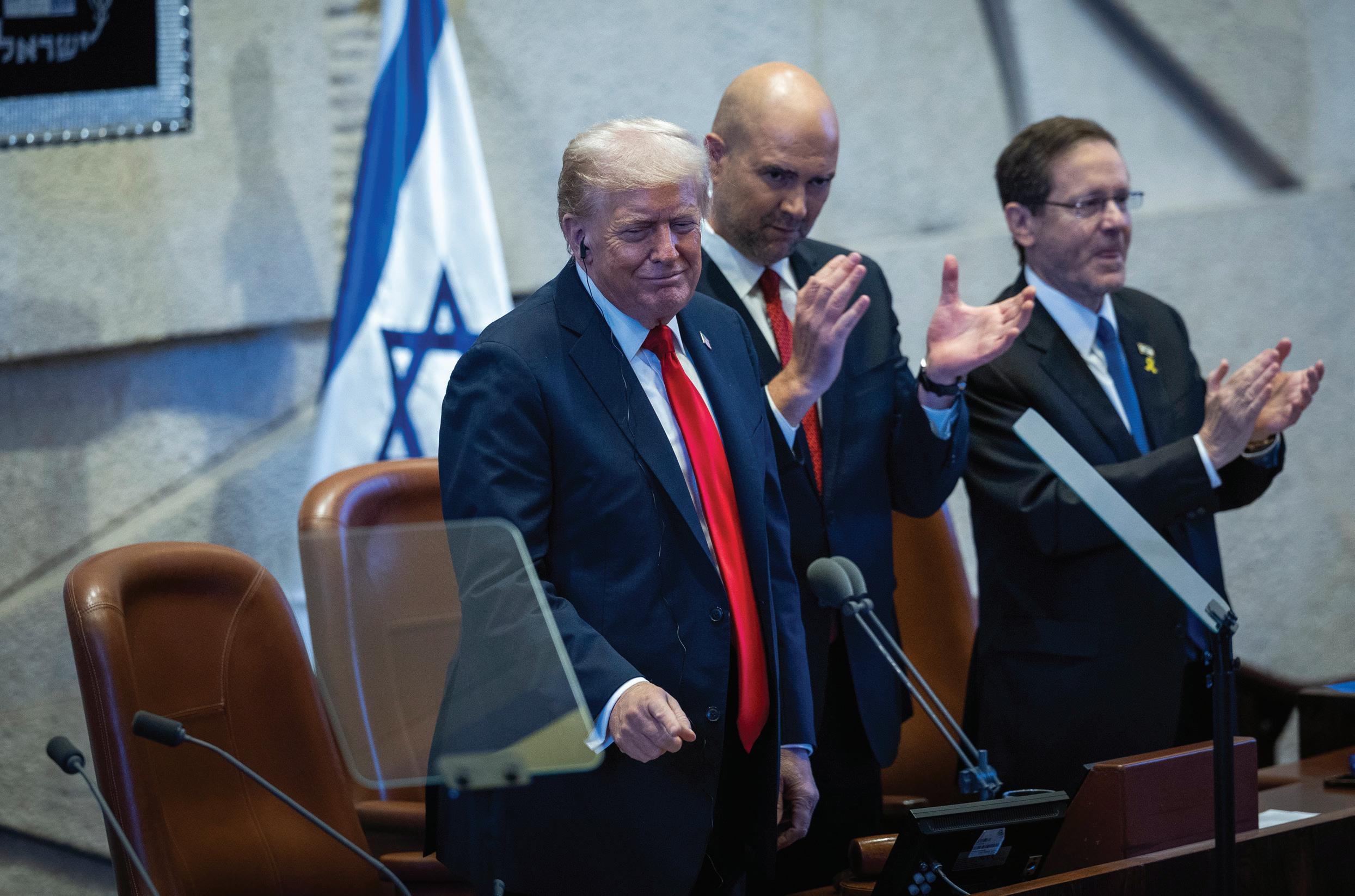
DECODING THE TRUMP PLAN FOR GAZA
BY DAVID PARSONS, ICEJ SENIOR VICE PRESIDENT & SPOKESMAN
There was great cause for rejoicing in Israel when the last 20 living hostages recently returned home from Gaza just hours before Simchat Torah – exactly two years on the Hebrew calendar since the Hamas massacres of October 7, 2023. Following a sudden breakthrough in ceasefire talks, the Israeli cabinet promptly convened to approve the first phase of US President Donald Trump’s 20-point plan for rebuilding Gaza. Trump then quickly jetted to Israel to tell the Knesset and nation that they had won the war, just as the last living captives in Gaza came home that very day.
Yet amid the euphoria, many Israelis have found it hard to believe the war is truly over. There also is a foreboding sense that the victory is not as complete as it needed to be – especially given the costs in shattered lives at home and the nation’s tarnished image abroad.
No doubt, the enemies of Israel have not given up the fight. And this is not the first time that Israelis have had a resounding victory snatched from their hand at the last minute.
The classic example is the 1973 Yom Kippur War, when US Secretary of State Henry Kissinger came to save the Egyptian Eighth Army after Ariel Sharon cut off their retreat route and his tanks stood unopposed only 101 kilometers from Cairo. The reasoning was that if Israel imposed too humiliating a defeat on its Arab foes, such as in the 1967 Six-Day War, Arab rulers would feel pressured to restore their honour rather than seek peace. So, US presidents have tended to rein in Israel during war, yet each time it seems to rob Israel of a well-deserved victory.
To his credit, Trump refused for many months to force Israel to hit the brakes in Gaza. This greatly frustrated other world leaders, such as French President Emmanuel Macron, who responded by leading the misguided push for global recognition of a Palestinian state.
Yet Trump finally insisted on bringing the war to a close and his team found a formula for making it happen. For Israelis, his new plan offered the chance to get back all the live hostages on day one – something Prime Minister Benjamin Netanyahu could not refuse.
Meanwhile, Trump envoys Steve Witkoff and Jared Kushner were able to convince the Arab and Muslim states that the only way to spare the
people of Gaza from further suffering was to remove Hamas from any future role in Gaza. Otherwise, Hamas was willing to fight on to the last Gazan.
Yet as soon as the deal was signed by the various parties, it became clear this was still a work in progress. For instance, phase two of Trump’s plan calls for Hamas to hand over control of governing Gaza to an interim technocratic cabinet overseen by an international “Board of Peace”, none of which even exists yet.
In addition, security in Gaza is to be handled by an international stabilization force that also remains at an embryonic stage. It will be led by Egypt and will likely include troops from Azerbaijan and Indonesia. But Israel is adamantly opposing efforts by Turkey in particular to join the force, given President Recep Tayyip Erdoğan’s brazen hostility to Israel.
Netanyahu was able to make some key last-minute changes to the Trump plan, such as requiring Hamas to disarm. But who will ensure that a defiant Hamas hands over all its weapons? And why has Hamas been allowed to openly take back the streets of Gaza?
There are many more serious questions about Trump’s comprehensive phased plan for rebuilding Gaza, which no doubt will be fraught with many twists and turns.
But what is clear is that Israelis are deeply indebted to Trump, and for the remaining three years of his presidency they will be dependent on him not to force a Palestinian state upon Israel. His 20-point Gaza plan only says that down the road, circumstances “may” ripen to start talking about Palestinian statehood. But Trump and his closest Mideast advisers also have very wealthy, powerful Arab rulers now pulling him in that very direction.
This means Christians with a heart for Israel will need to continue our unceasing support and prayers for this nation, just as we did during the last two years of war. Trump has been exceptionally favourable to Israel so far. And in his recent Knesset speech, he began by acknowledging the “God of Abraham, Isaac and Jacob”, and closed by simply saying: “I love Israel!” Let’s hope and pray that both remain steadfastly true in his heart. .
IDF soldiers bring home a rescued Israeli hostage from Gaza in 2024 (Credit: Ilia Yefimovich-dpa-AP Images)
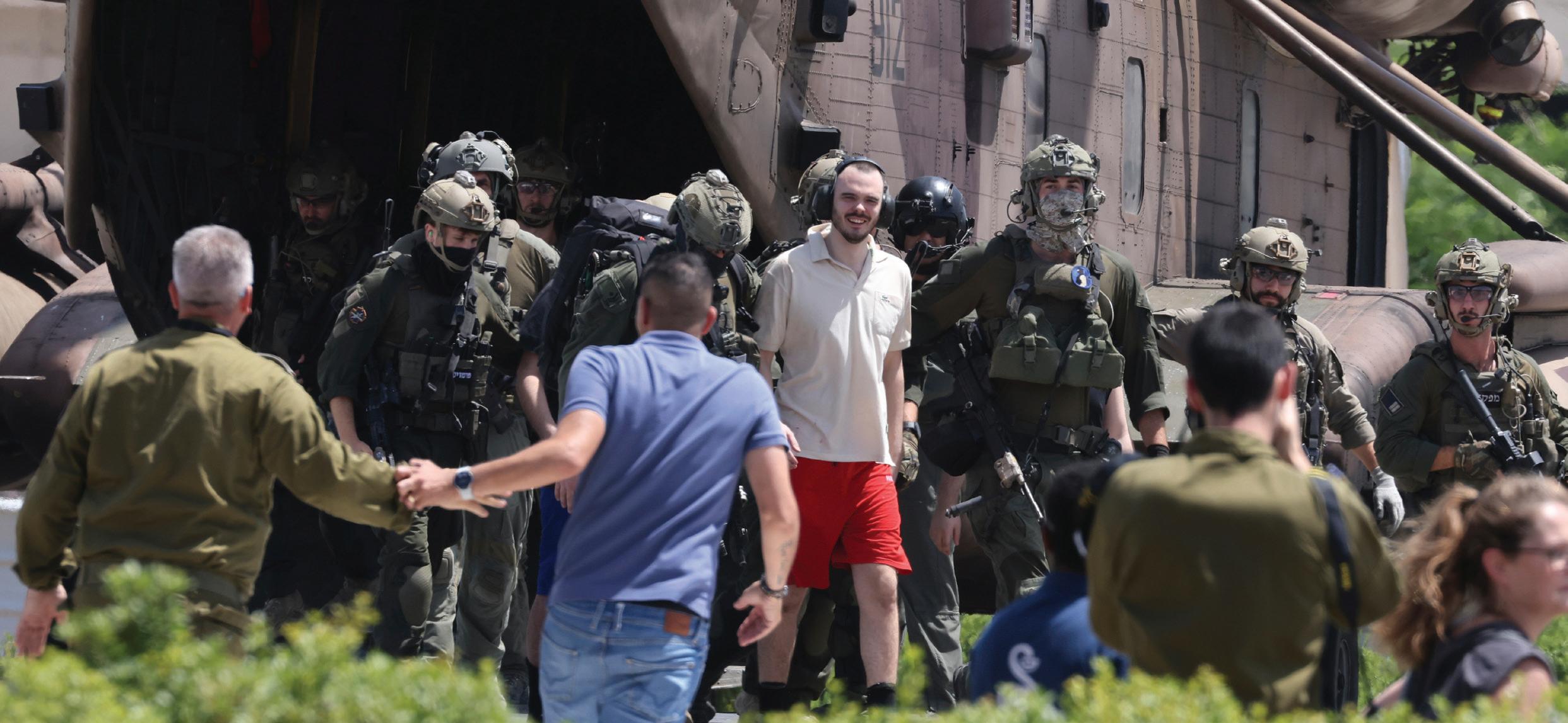
THE DANGERS AND DEFECTS OF RECOGNISING A PALESTINIAN STATE
[CONDENSED FROM RECENT ICEJ STATEMENT]
The recent diplomatic campaign by the international community to recognise a Palestinian state without Israeli consent was fraught with defects and dangers. First and foremost, it marked a very sharp, problematic departure from the longstanding international consensus that the Israel-Palestinian conflict is best resolved through direct negotiations between the parties themselves. The campaign also was flawed for other key reasons:
1) It would be a grotesque reward for the Hamas atrocities of October 7.
2) The Palestinians do not meet the international legal criteria for statehood, as they do not have a sole, unified authority in effective control of the territories they claim.
3) It showed profound ignorance of the present division of labour within Palestinian society, as the Palestinian Authority is waging lawfare to strip Israel of its legitimacy and right of self-defence, while Hamas is engaged in terrorism and violence against Israel.
T4) Israel has a superior legal and historic right and claim to sovereignty in the disputed territories.
5) Granting recognition of a Palestinian state without Israel’s consent would violate previous United Nations Security Council resolutions and the Oslo Accords of 1993.
6) Such a move would derail peace efforts and destabilise the region by giving the Palestinians false hopes that they can unilaterally achieve statehood outside of direct talks with Israel.
7) Those European nations supporting this diplomatic initiative were violating the European Union’s customary practice of acting only by consensus on major foreign policy issues.
8) This campaign was a feeble and reckless response to the current wave of global antisemitism, which all nations must confront with courage and not cowardice.
THE DUPLICITOUS CHARGE OF ‘GENOCIDE’ AGAINST ISRAEL
[CONDENSED
FROM RECENT ICEJ STATEMENT]
hroughout its long two-year war with Hamas, Israel has faced repeated accusations of “genocide” from many sources, including United Nations officials and prominent world leaders. One recent example was the resolution of the International Association of Genocide Scholars, which turned out to be a shameful, secretive attempt by a small clique of antisemites within the organisation to dupe the world on false academic pretences.
This careless use of the charge of genocide against the Jewish state threatens to undermine the valued safeguards in international law against this gravest of crimes, and also reveals the duplicitous motives of those seeking to malign Israel. For the Jewish people, accusations of genocide against Israel carry a deeper, double meaning, as such charges are a painful inversion of Jewish suffering in the Holocaust, trivialising that immense catastrophe even while turning Israelis into Nazis.
The charges of genocide against Israel also fail because:
1) The Genocide Convention of 1948 defines “genocide” in very narrow terms as requiring specific intent “to destroy, in whole or in part, a national, ethnical, racial or religious group.” Yet Israel has been trying to spare the lives of Gazans by allowing in daily shipments of food and aid, creating safe zones for civilians, allowing evacuations of the wounded, and giving advance warning of precision military strikes via dropped leaflets, phone calls, SMS messages, and social media alerts.
2) Israel made clear the war could end if Hamas released the Israeli hostages, agreed to disarm, and relinquished control of Gaza.
3) The mounting death toll in Gaza is troubling, but even the international community bears some responsibility for this by overwhelmingly insisting that all Palestinian civilians in Gaza remain on the battlefield, rather than being allowed to evacuate to safety – an unprecedented act in the history of modern warfare.
4) Independent studies have refuted the genocide charges by exposing flawed Hamas-sourced casualty data and a lack of evidence for systematic targeting policies.
In contrast, Hamas has not only exhibited genocidal behaviour, but also it has openly proclaimed in its founding Charter the group’s genocidal intent to destroy the Jewish state on religiousideological grounds. The atrocities committed by Hamas on October 7, including rapes, murders, torture and abductions, flowed from this odious ideology.
The chorus of charges that Israel has committed genocide in Gaza collapses under careful, objective scrutiny. In truth, this is but another blood libel against the Jewish state and people. The war in Gaza has been intense, complicated and stressful for everyone involved. But by issuing warnings before strikes, facilitating humanitarian aid, and offering peace in exchange for the release of hostages, Israel’s conduct has been incompatible with genocidal intent. These facts stand in stark contrast to Hamas, whose founding charter, rhetoric and actions openly aim for the annihilation of the Jewish people.
PRESIDENT HERZOG HOSTS ICEJ-LED DELEGATION OF LOCAL EVANGELICAL LEADERS
ICEJ President Dr. Jürgen Bühler recently arranged for a delegation of local Evangelical leaders to have an audience with Israeli President Isaac Herzog at his official residence of Beit Hanasi. The delegation included David Parsons, Fine Ditoka and Vesna Bühler of the Christian Embassy, Rev. Chad Holland of the King of Kings Assembly in Jerusalem, CFI International Director Tristan Hall, and Victor Kalisher, director of the Israel Bible Society. The group gave President Herzog updates on their respective activities in support of Israel over the past two years of war, and also discussed issues of mutual importance with him. Dr. Bühler was especially keen to thank Herzog for his strong moral leadership and unifying voice throughout the conflict.

Israeli President Isaac Herzog hosts ICEJ-led delegation of local Evangelical leaders (Courtesy President’s Office)

FIJI OPENS EMBASSY IN JERUSALEM
BY DAVID PARSONS, ICEJ SENIOR VICE PRESIDENT & SPOKESMAN
In a milestone event underscoring the strong relations between Fiji and Israel, Fijian Prime Minister Sitiveni Rabuka joined Israeli Prime Minister Benjamin Netanyahu in officially inaugurating the new Embassy of Fiji in Jerusalem in mid-September. The ICEJ’s branch in Fiji has worked for decades towards this moment, and the International Christian Embassy Jerusalem was well represented at the embassy opening and other events during PM Rabuka’s historic visit to Israel.
At the inauguration ceremony, Prime Minister Rabuka noted that “our presence here reflects our desire to build bridges – not walls – between nations, cultures, and peoples… The people of Fiji share a very close religious and cultural connection to the Holy Land. We deeply value your great nation, which is the birthplace of Christianity. Our similarities, faith and common values continue to strengthen us together in unity and solidarity... I hope this Embassy will be a place where Pacific wisdom meets Middle Eastern innovation.”
Prime Minister Netanyahu expressed gratitude to Rabuka and the Fijian people for the opening of Fiji’s Embassy in Jerusalem, saying that Israel and Fiji share a strong friendship founded on mutual respect, religious and common values, and a commitment to peace and prosperity.
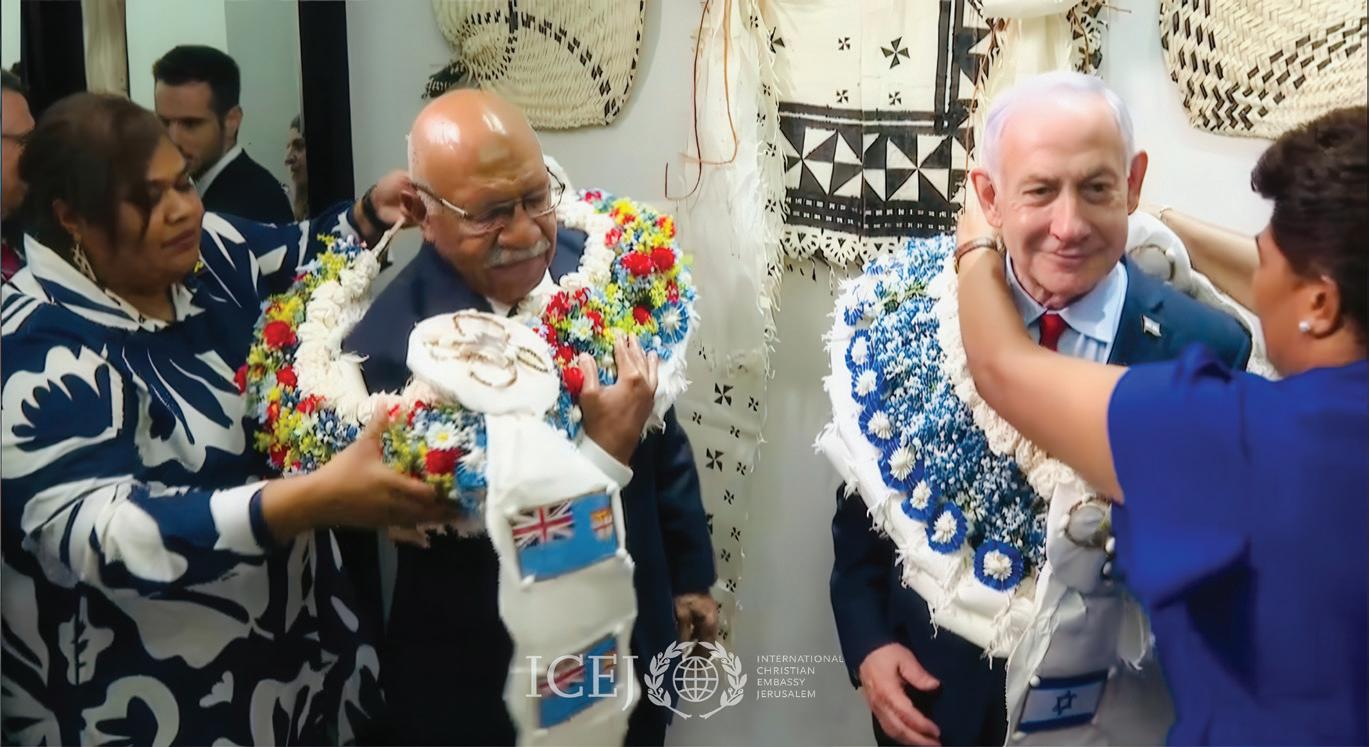
Rabuka and Netanyahu.
Fiji becomes the 100th diplomatic mission in Israel and the seventh country to open its Embassy in Jerusalem, alongside the U.S., Guatemala, Honduras, Kosovo, Papua New Guinea and Paraguay.
The next evening, ICEJ President Dr. Jürgen Bühler had the privilege of bestowing the Cyrus Award on Prime Minister Rabuka at a banquet held in his honour at the Friends of Zion Museum. Named for a key biblical figure, the Cyrus Award is given to heads of government who have the wisdom and courage to open their nations’ embassy in Jerusalem.
The ICEJ was founded in 1980 on the principle of Christian recognition of the 3,000 yearold Jewish claim and connection to Jerusalem, as is affirmed in the Bible. The ICEJ and its branch offices in over 90 nations have advocated ever since for the nations to return to Jerusalem by opening their embassies in the Israeli capital city. We congratulate the ICEJ-Fiji branch for their success in convincing the government and people of Fiji that this is the right and moral position for their nation to take.
At the Embassy opening, Fijian natives Fine Ditoka and Kelera Cirimaiwasa of the ICEJ staff in Jerusalem had the honour of placing traditional welcome wreaths on prime ministers
ICEJ BUILDS GREENHOUSE CLASSROOM FOR ISRAEL’S FUTURE FARMERS
BY NATIVIA BÜHLER
At the Agro-Tech School in Sde Nitzan, students, parents and teachers recently gathered for the first Parents’ Day of the new school year, and for the official opening of its new technological greenhouse, a project funded by donors of the International Christian Embassy Jerusalem.
The greenhouse classroom marks an important milestone for the Eshkol region, one of Israel’s main agricultural centers, which was among the hardest hit areas by the October 7 attacks. The area’s farms produce more than 70 percent of Israel’s fresh vegetables, but in the months following the war, production dropped sharply. Nearly 20,000 foreign agricultural workers left the country, and local growers struggled to maintain operations.
In response, local educators and community leaders launched the Agro-Tech Project, the first agricultural education program to be established in the Gaza border region since the war. The goal is to train the next generation of young Israelis so that they can help rebuild the agricultural sector, bring innovation to an industry that remains vital to national food security, and connect with the Land of Israel.
“The idea was born out of necessity,” said Asaf, founder of the program. “We realised that the future of agriculture here depends on engaging young people, giving them the tools and the motivation to take part in restoring and advancing this field.”
The ICEJ-sponsored greenhouse serves as the center of the program. Students learn to grow vegetables in controlled conditions using modern agricultural systems, while also studying water and soil

management, irrigation technologies, seed genetics, and marketing. They work directly with local farmers and agro-tech companies to gain practical experience, combining hands-on training with exposure to Israel’s leading agricultural innovations.
To open the new school year, parents joined the 50 enrolled students in planting the first rows of tomatoes, cucumbers, lettuce and cabbage together. The event was both a practical lesson and a show of community partnership with families, teachers, and students working side-by-side in the same soil that for two years has been left untended.
The Eshkol Regional Council is home to 33 villages with around 17,500 residents, many of whom depend on agriculture for their livelihood. While much of the region is still rebuilding, projects like this one offer a new path forward. By introducing technology and education into the recovery process, the Agro-Tech School is equipping young Israelis with the knowledge and confidence to sustain the land for the long term.
Through its partnership, the Christian Embassy is helping ensure that Israel’s agricultural communities are not only restored but strengthened for the future. The hope is that what begins in the greenhouse will extend across the fields of the South, by empowering students, supporting farmers, and securing Israel’s food production for years to come.
Please support the ICEJ’s efforts to help the Israeli communities of the western Negev recover and rebuild following the devastating October 7 terror attacks. Give today to our “Israel in Crisis” fund.
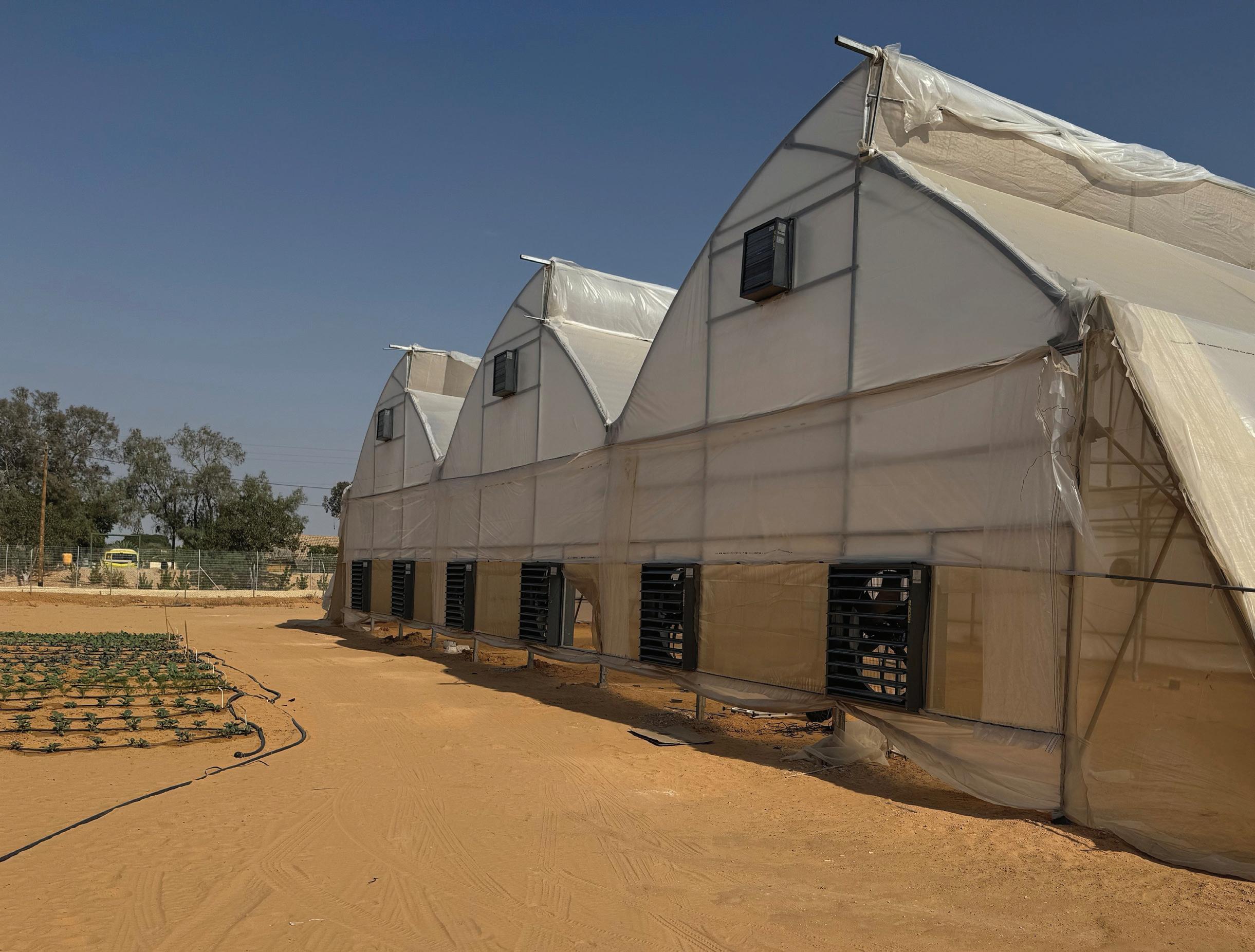
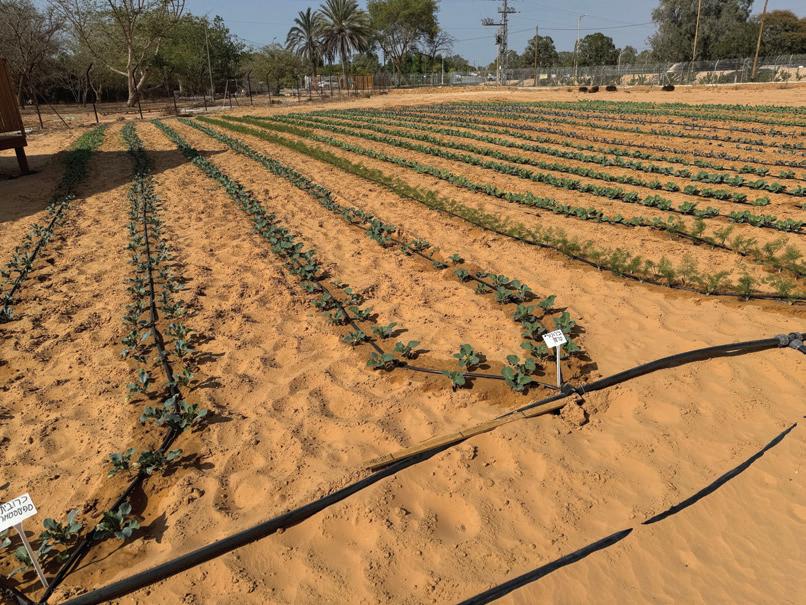
Rows of vegetables planted by the students at the Agro-Tech School in Sde Nitzan are beginning to grow.
The new ICEJ-sponsored greenhouse at the Agro-Tech School in Sde Nitzan.
ICEJ HELPS SMALL BUSINESSES IN NORTHERN ISRAEL REBUILD
BY NATIVIA BÜHLER
You most likely know the phrase: “Give a man a fish and you feed him for a day; teach a man to fish and you feed him for a lifetime.” That saying captures the heart of the ICEJ’s latest aid project in northern Israel.
When the war broke out in October of 2023, life in Israel’s north stopped overnight due to the looming threat of Hizbullah in Lebanon. Families were evacuated, entire towns emptied, and businesses that had taken years to build were shuttered, with no time to prepare alternative plans. For many, the challenges escalated when tens of thousands of men and women were called up for military reserve duty, leaving their families to manage households alone. Households suddenly operated as single-parent homes, often with mothers juggling traumatised children and the uncertain future of their businesses.
But now, an ICEJ-sponsored support program is walking alongside these business owners in the hard-hit northern towns of Shlomi and Ma’ale Yosef. The Christian Embassy first supported 62 small businesses with seed funding that helped launch a program which now reaches 460 businesses across Israel’s north and south. Each small business receives a tailored plan to meet their unique needs, ranging from business coaching and marketing support to help with branding, accessing government benefits, and sometimes direct grants. The program’s goal is not survival, but long-term recovery, by restoring income, building resilience, and supporting the renewal of local communities.
The impact is evident in the border town of Shlomi, right next to the border with Lebanon. Yochai, a respected martial arts coach, once ran a thriving studio for 170 children and teenagers. His gym was a second home for
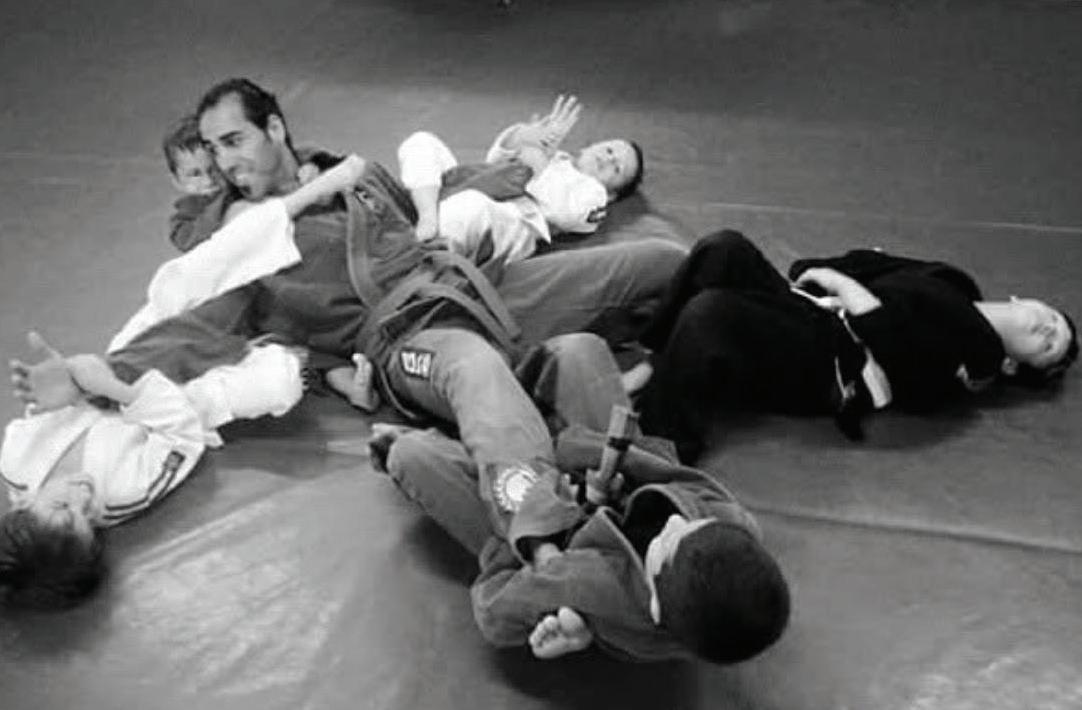
kids who learned discipline, strength and respect. But the evacuation scattered his students, and the doors closed.
Now, months later, Yochai has returned, but to a different reality. Only 30 students have returned, while rent debts of 60,000 Israeli shekels weigh heavily on him.
“I don’t want to give up,” he said. “The kids need a place like this. And I need to make it work.”
He explained his efforts to rebuild with the help of a business mentor and digital advertising grants. The ICEJ’s support has provided him with mentoring and grants, helping Yochai rebuild his school and keep his students engaged. By spring, he hopes to have 100 students back on the mats.
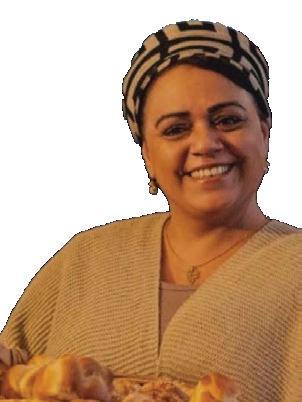
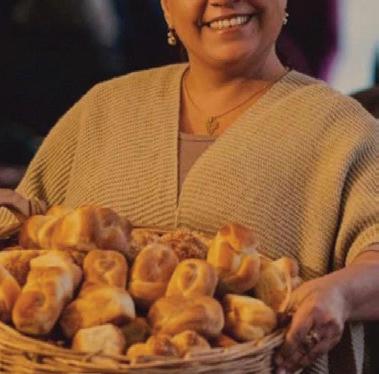
Not far away, Orly, refused to let the evacuation stop her catering business. From her hotel room in Jerusalem, where she was evacuated with her children, she continued cooking meals for fellow evacuees. Her small home-based business once brought in about 100,000 Israeli shekels annually, supplementing her regular job. Today, she is back in Shlomi, trying to rebuild her customer base even as she works part-time to keep her family afloat. Through the ICEJ’s support, Orly received digital promotion training and is reconnecting with customers and regaining momentum for her business.
Einav, mother of an autistic child, had found economic stability by combining two

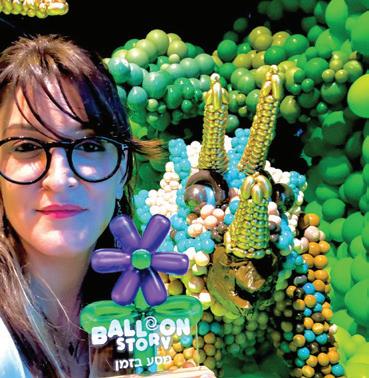
business ideas: a rustic guesthouse for couples and a balloon-decorating business for events. The war impacted both, leaving her with debts and the burden of running her home alone. With the Christian Embassy sponsoring her consulting advice and marketing support, Einav is gradually restoring her businesses and ensuring a steady income for her family.
For business owners like Yochai, Orly and Einav, rebuilding is a journey. Through this program’s targeted support and their determination, these entrepreneurs are not simply returning to the past, but creating stronger, renewed businesses that contribute to the future of northern Israel.
Municipal leaders emphasise that these are just the first steps. By supporting business owners in restarting and renewing their businesses, the program seeks not only to provide for families but also to restore the vital economic and social heartbeat of northern Israel.
Thank you for standing with Israel during this challenging time. Please consider donating to help families and small businesses rebuild through our Israel in Crisis fund.
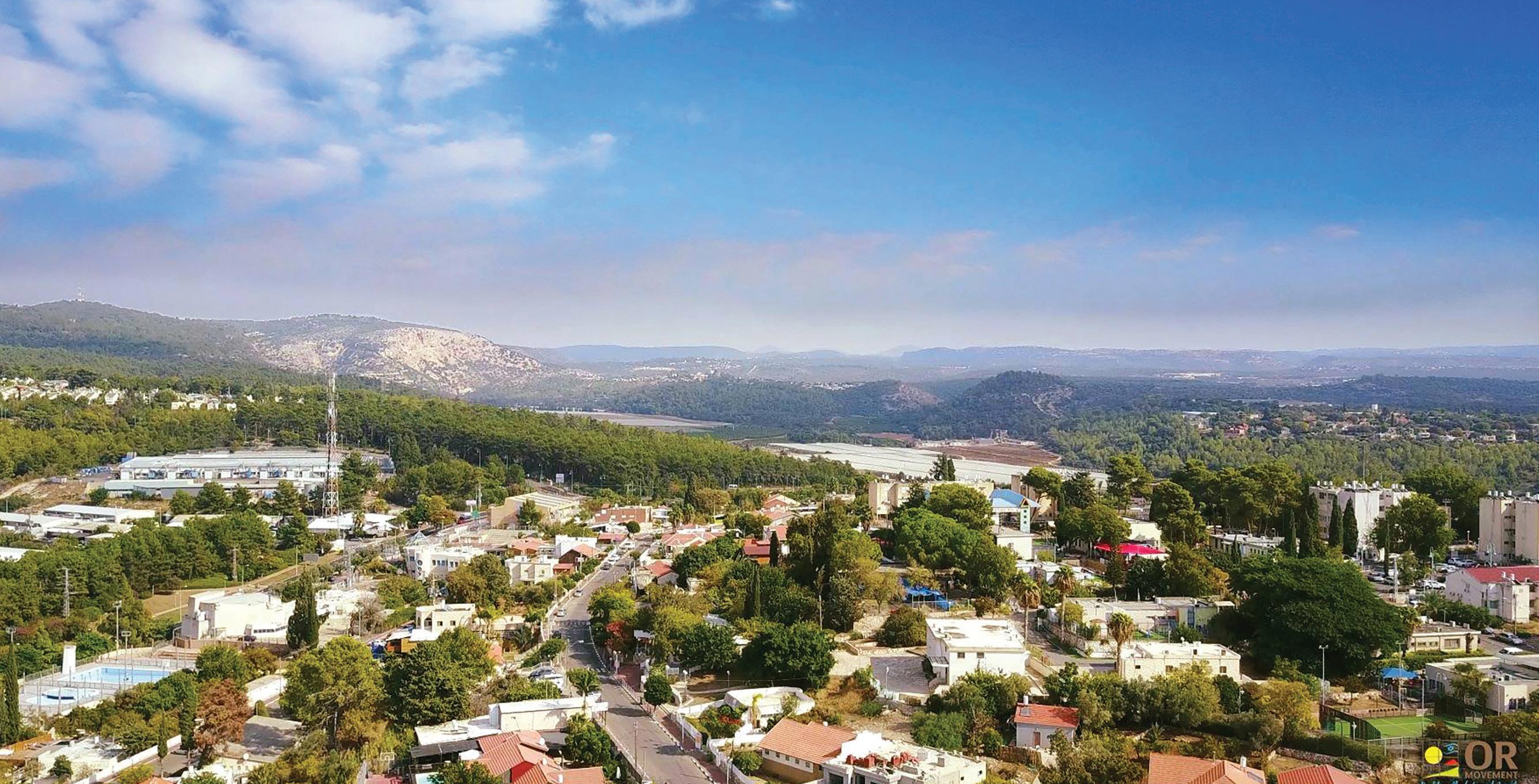
Photos courtesy of small business support program
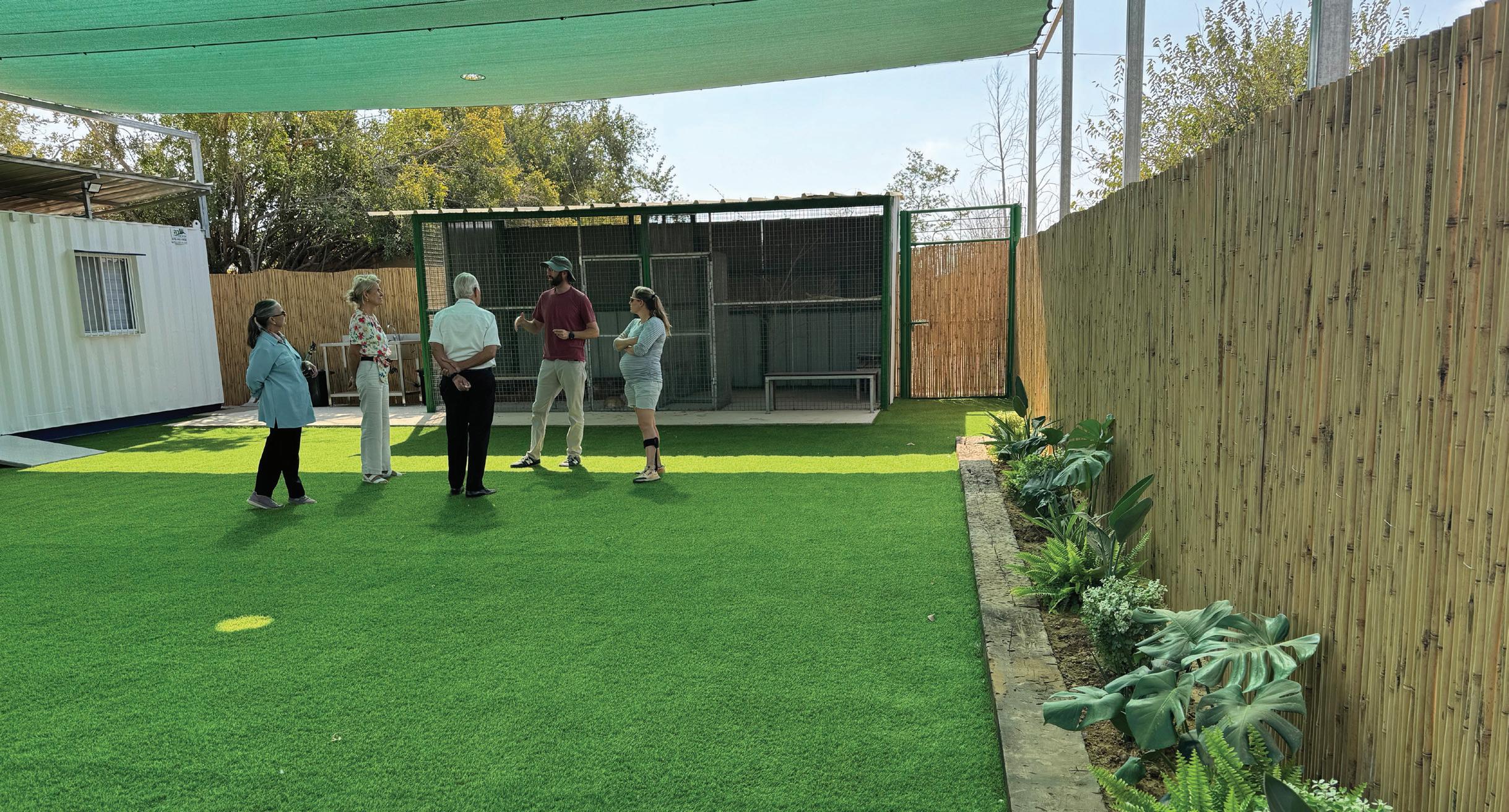
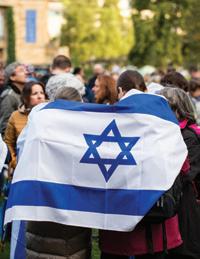
ICEJ FUNDING NEW ANIMAL THERAPY CORNER FOR ISRAEL’S TRAUMATISED CHILDREN
BY NATIVIA BÜHLER
At Kibbutz Urim, only a few kilometers from Gaza, a horse therapy ranch and animal corner had been serving children and adults from throughout the region to deal with the trauma of years of incessant rocket barrages. But the October 7 terror invasion forced the community to evacuate and the ranch to close, even at a time when the number of Israeli children and adults needing trauma care rose exponentially.
But now, the horse ranch is back up and running, with the addition of three new therapy horses so far sponsored by the International Christian Embassy Jerusalem. And right next door, a long-awaited vision is starting to come to life.
In October, Kibbutz Urim unveiled the first phase of its refurbished “animal corner,” a safe and welcoming space where children can interact with gentle animals to overcome trauma. The rest of the permanent ICEJ-sponsored Animal Therapy Corner currently remains in the planning stages, but this pilot project offers an initial glimpse of how the structured animal-assisted therapy center will support traumatised children.
Though small in scale, the pilot site already has the essential elements in place: two therapists on staff, two therapy rooms, animal enclosures, and a wide, fenced green lawn. Inside the enclosures are rabbits, hamsters, and parrots, with plans to welcome chickens and eventually dogs. The site is intentionally designed to be secure, so that children engaging with the animals can feel calm and protected.
This opening stage is temporary but important, as it allows the team to experiment with therapeutic approaches, test practicalities, and refine the overall vision before full-scale construction begins.
“This allows the therapists and organisers to observe how children respond and identify the resources they will need long-term to remain sustainable and effective”, explained Nicole Yoder, ICEJ Vice President of AID and Aliyah.

The need for such spaces is pressing. According to a recent report by the National Insurance Institute, since the beginning of Israel’s war against Hamas in Gaza two years ago, 56 children and teens have been murdered, 389 have lost at least one parent, 38,628 were evacuated from homes near the northern and southern borders, and at least 23,212 have been recognised as physically or mentally damaged. Of these, 2,952 children were found to be suffering from significant trauma. There were 30 suicide attempts among children aged up to 9 years old, a 25% increase from 2023. As of March eight months ago, 37 children still had parents in Hamas captivity.
The scale of these numbers underscores the urgent need for safe, nurturing spaces where children can begin to process their experiences and rebuild a sense of security. Kibbutz Urim’s envisioned Animal Corner is taking on this responsibility, offering dozens of children the chance to take steps toward emotional recovery.
With two therapists already active and capacity for dozens of sessions each week, the temporary animal corner offers a glimpse of what the permanent facility will one day provide on a much larger scale. And Kibbutz Urim has an advantage in that residents of the Gaza border region are already familiar with the trauma care services provided by its horse therapy ranch and previous petting zoo.
The new Animal Corner is already making a difference in the lives of children affected by trauma from two years of war. Now we just need to raise the final sums to complete the full vision.
Thank you for your generous gift towards this project, which will bring much healing to traumatised children. You can direct your giving to our Israel in Crisis fund.
First phase of new Animal Therapy Corner at Kibbutz Urim.
Cuddly rabbit at Kibbutz Urim Animal Therapy Corner.

FROM VILNIUS TO JERUSALEM, THE ALIYAH WAVE IS RISING
BY HOWARD FLOWER, ICEJ ALIYAH DIRECTOR
In September, 86 Russian-speaking Jews from across Europe gathered in Vilnius, Lithuania for an intensive Aliyah seminar organised by The Jewish Agency for Israel, the ICEJ’s long-time partner. The location carried profound significance. This city, once known as the “Jerusalem of the North,” was home to the great Gaon of Vilna, who revolutionised Jewish thought about returning to Zion. Nearly three centuries later, his vision is coming to life in the most practical way possible.
The Gaon, a towering 18th-century Talmudic genius, taught something revolutionary for his era: that Jews should not wait passively for divine intervention but should actively begin their return to the Land of Israel. His concept of Atchalta De’Geulah—the beginning of redemption—asserted that human action from below would initiate divine response from above. Today, as antisemitism surges across Europe and Jewish families pack their belongings for Israel, this vision is unfolding before our eyes.
Those taking part in the Vilnius seminar represented a microcosm of Western Jewry’s current reality. Among them were families from Germany, where Jews increasingly feel like “tourist attractions”, as young Alon Kogan from Offenbach described it before making Aliyah. There were participants from Latvia and Lithuania, where Jewish communities that once thrived now struggle with dwindling numbers. Ukrainian Jews displaced by war sat alongside Finnish and Estonian families, all united by a common conviction that it was time to go home.
The four-day program moved powerfully between remembering the past and building for the future. One evening, participants created a memorial display to honour the local Jewish communities destroyed during the Holocaust. The next morning, young people led the entire group through team-building exercises, their energy and optimism filling the room. This is the essence of modern Aliyah: remembering why Jews must never be vulnerable again while actively building the solution.
The numbers tell an urgent story. Since October 7, 2023, over 60,000 Aliyah files have been opened. In France alone, where the ICEJ has worked since 2010, there is a 53% increase in immigration to Israel this year. Surveys indicate that 38% of French Jews—approximately 200,000 people—are now considering to move to Israel. Behind each statistic is a family like Alison’s from Marseille, who explained, “I wanted to raise my future children in a place where they could be proud of their Jewish identity without fear.”
For over two decades, the Christian Embassy has been working with JAFI to build the infrastructure to support this modern exodus. The Naale program helps teenagers complete their high school education in Israel, with 90% choosing to stay permanently. Talia, a Frankfurt student, captured its impact perfectly.
“My grandparents hid their Judaism in Ukraine. My parents rediscovered it in Germany. Now, I get to live it fully in Israel”, said Talia.
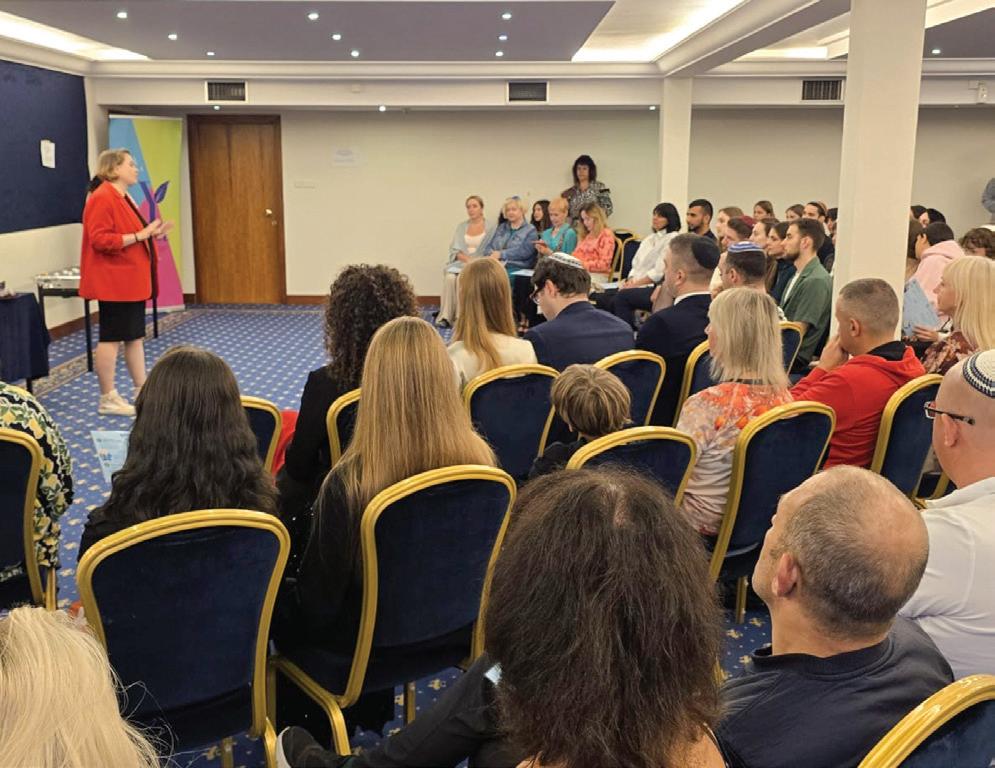
In the Baltic states, ICEJ’s seasonal camps have reached over 1,000 young Jews, introducing them not just to Israeli culture but to practical pathways for making Aliyah. Since late 2022, the organisation has sponsored flights for 250 new Jewish immigrants directly from this region.
A solidarity march through the historic streets of Vilnius, with participants carrying Israeli and Baltic state flags, demonstrated the movement is confident and growing. When families with young

children joined elderly community members in the march, wearing shirts declaring their readiness to fight antisemitism, it made a very bold public statement of Jewish identity.
Yet for all these efforts, an unprecedented challenge looms. Jewish Agency chairman Doron Almog predicts Israel may welcome one million new immigrants in the coming years. The needs—from flights to absorption programs to youth camps—are staggering. ICEJ currently assists approximately 12% of all olim (newcomers), but the Aliyah wave is growing.
This is where partnership becomes essential. Every sponsored flight costs, on average, a thousand US dollars. Each youth camp requires funds for bus transport. The preAliyah seminars need support. Contributing to this mission means participating in a historical movement that the Gaon of Vilna envisioned three centuries ago.
The journey home is underway, from Vilnius to Jerusalem, from the Baltic Sea and Western Europe to Eretz Israel. Every sponsored flight, every youth camp, every preparatory seminar adds another chapter to this ongoing story of Jewish return to the Land of Israel. Will you help ensure every Jew can make that journey?
ALIYAH
Aliyah seminar in Vilnius.
Seminar participants march through Vilnius in bold statement of Jewish identity.

ICEJ HELPS ETHIOPIAN JEWS FULFIL DREAM OF COMING HOME
BY HOWARD FLOWER, ICEJ ALIYAH DIRECTOR
For generations, Jewish families in Ethiopia have held fast to the dream of returning to their ancestral homeland in Israel. This is a hope passed down over many centuries, as a prayer whispered in the face of hardship and persecution.
This year, the International Christian Embassy Jerusalem has been privileged to help answer that plea for 67 Jewish new immigrants from Ethiopia in 2025. In partnership with The Jewish Agency for Israel, and the generous gifts of Christians worldwide we have supported the Aliyah and initial absorption costs for these long-suffering Jewish families.
These are not just numbers. They are mothers, fathers and children whose long wait is finally over. After decades of longing, they have exchanged a life of fear for one of hope, welcoming the Jewish New Year, Rosh Hashanah, in Israel for the very first time. This marked the start of a new chapter in life in the land of their ancestors.
Between January and September of this year, 115 Ethiopian olim (newcomers) arrived in Israel, many of them thanks to ICEJ. The majority, a group of 74 individuals, were settled in the Beit Alpha absorption center, with smaller groups finding their first home in Israel in centers in Be’er Sheva and Ashkelon.
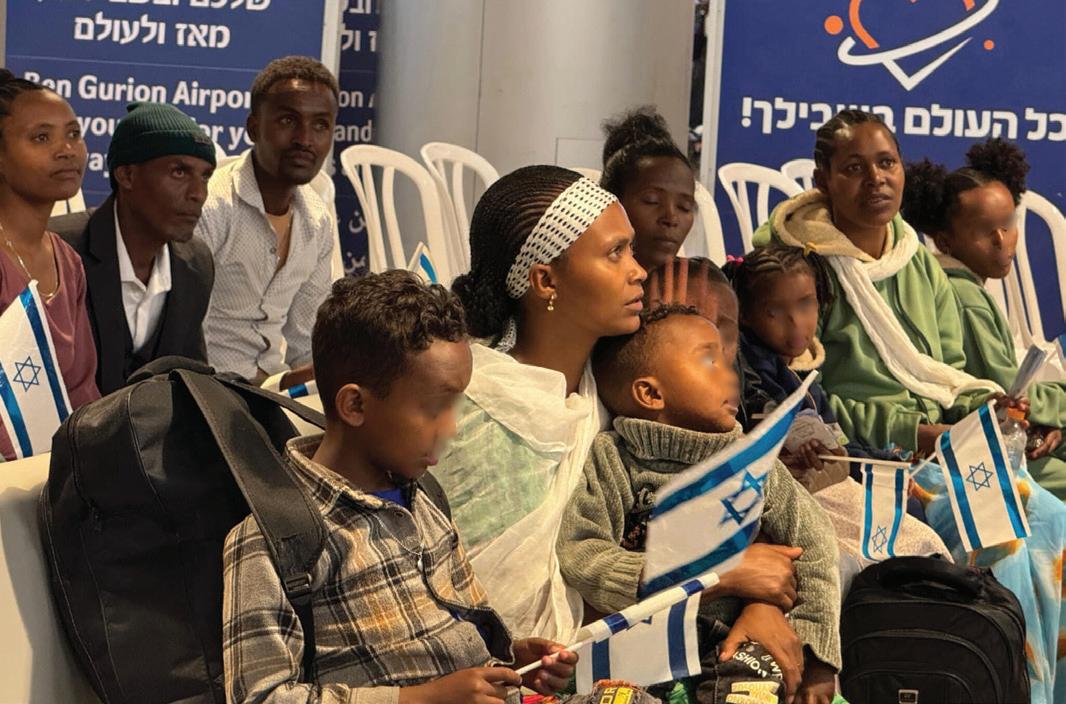
Upon arrival, adults immediately enrolled in Hebrew ulpan classes, the essential first step towards integration. Children were registered in local schools, many stepping into a proper classroom for the very first time. The Jewish Agency’s dedicated staff work tirelessly to guide each family through the practicalities of their new life: opening bank accounts, registering with health clinics, and navigating government offices.
But absorption is about more than paperwork; it is about healing, connection and building a new identity. Families participate in workshops on health, nutrition and home safety. They join orientation tours and receive both individual and group counselling. Children receive vital educational support to bridge learning gaps, while summer activities blend schooling with play.
Perhaps most profoundly, these new Israelis are connected to the
Jewish nation. They have visited the bustling streets of Tel Aviv and made an emotional pilgrimage to Jerusalem’s Old City and the Western Wall. To see them weep, rejoice, dance and pray at this holiest of sites is to witness prophecy fulfilled. These experiences root them in the rhythm of Jewish life from their very first months in the Land of Israel.
The story of the Freda family encapsulates the resilience and hope that defines this unique Aliyah from the heart of Africa. After waiting for 32 years, parents Malachiah (70) and Dipo (65) arrived at the Beit Alpha absorption center with their four children. They spoke openly of the violence and persecution they endured in Ethiopia because of their family’s Israelite identity. Malachiah was brutally beaten, requiring multiple surgeries, and his wife Dipo also suffered attacks.
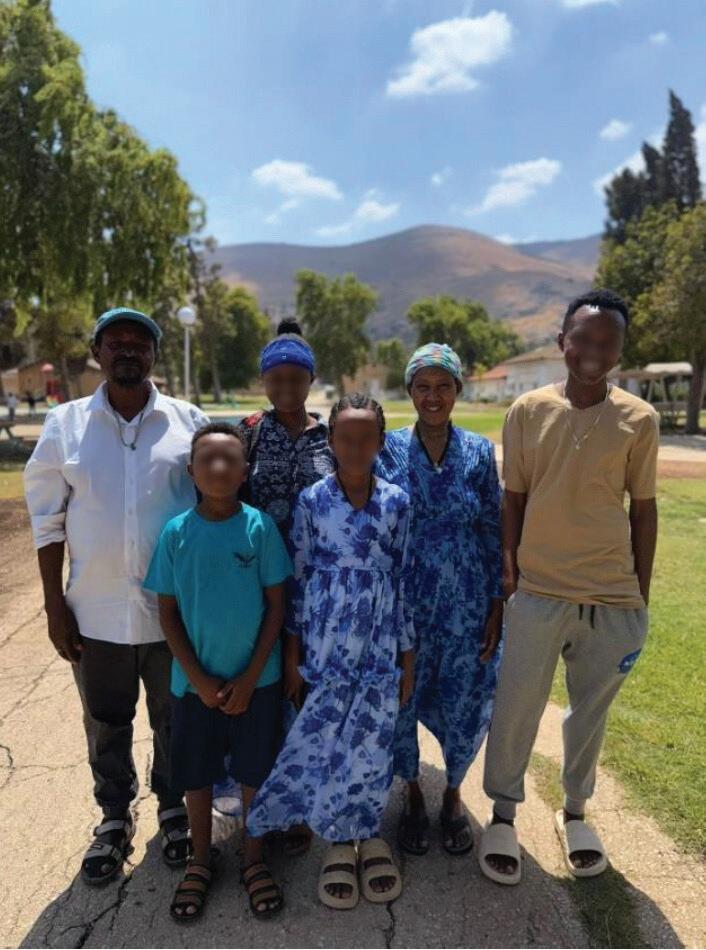
“For 32 years, we knew we were meant to come to Israel,” Dipo shared.
Now, safe at last, their focus is entirely on the future. While Malachiah and Dipo study Hebrew, their children are daring to dream. Eighteenyear-old Zina aspires to be a teacher. Yismaw, 16, is excited to learn Hebrew and become an electrical engineer. Most moving are the dreams of Habtam (12) and Dejen (10), who never attended any public schools in Ethiopia, instead spending their days tending cattle. Now, they are in a classroom for the first time, and both dream of becoming doctors.
Dipo summed up their hopes simply: “I believe we will live here in peace, and the children will be able to learn and grow in this country.”
The journey of Ethiopian Aliyah is one of steadfastness finally rewarded. It is a story we at the ICEJ are deeply honoured to help write. Your partnership is making this miracle happen, helping Ethiopian Jewish parents and children begin a new chapter in life in Zion, surrounded by community and guided every step of the way.
With your help, we look forward to continuing this sacred work, as together we welcome more Jews to Israel – from Ethiopia and all over the earth.
Ethiopian Jewish family at Ben Gurion Airport in the arrival room for new immigrants (Credit: JAFI)
The Freda family from Ethiopia (Credit: JAFI)
Yudit Setz delivers a food parcel to Gershom and Shoshana
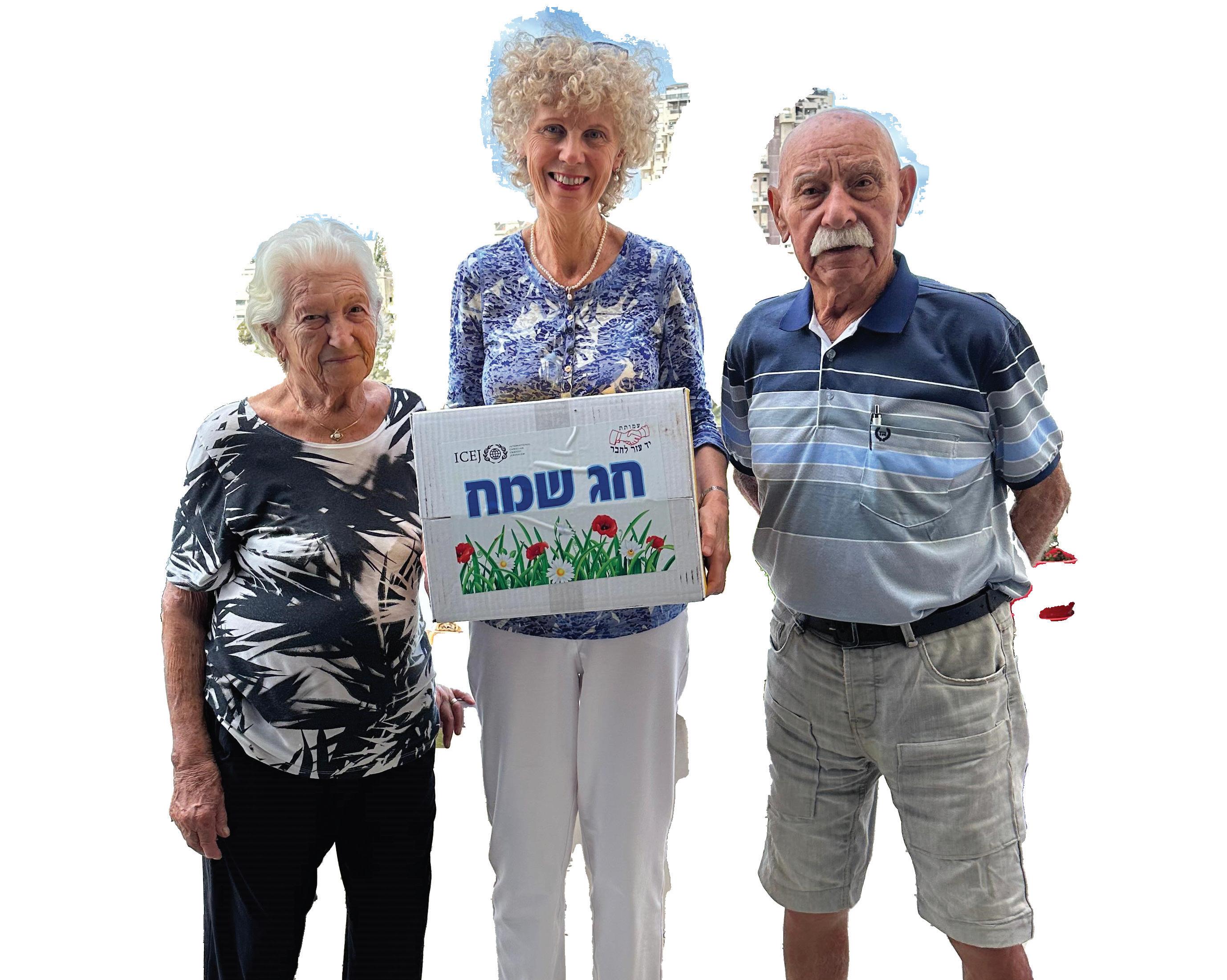
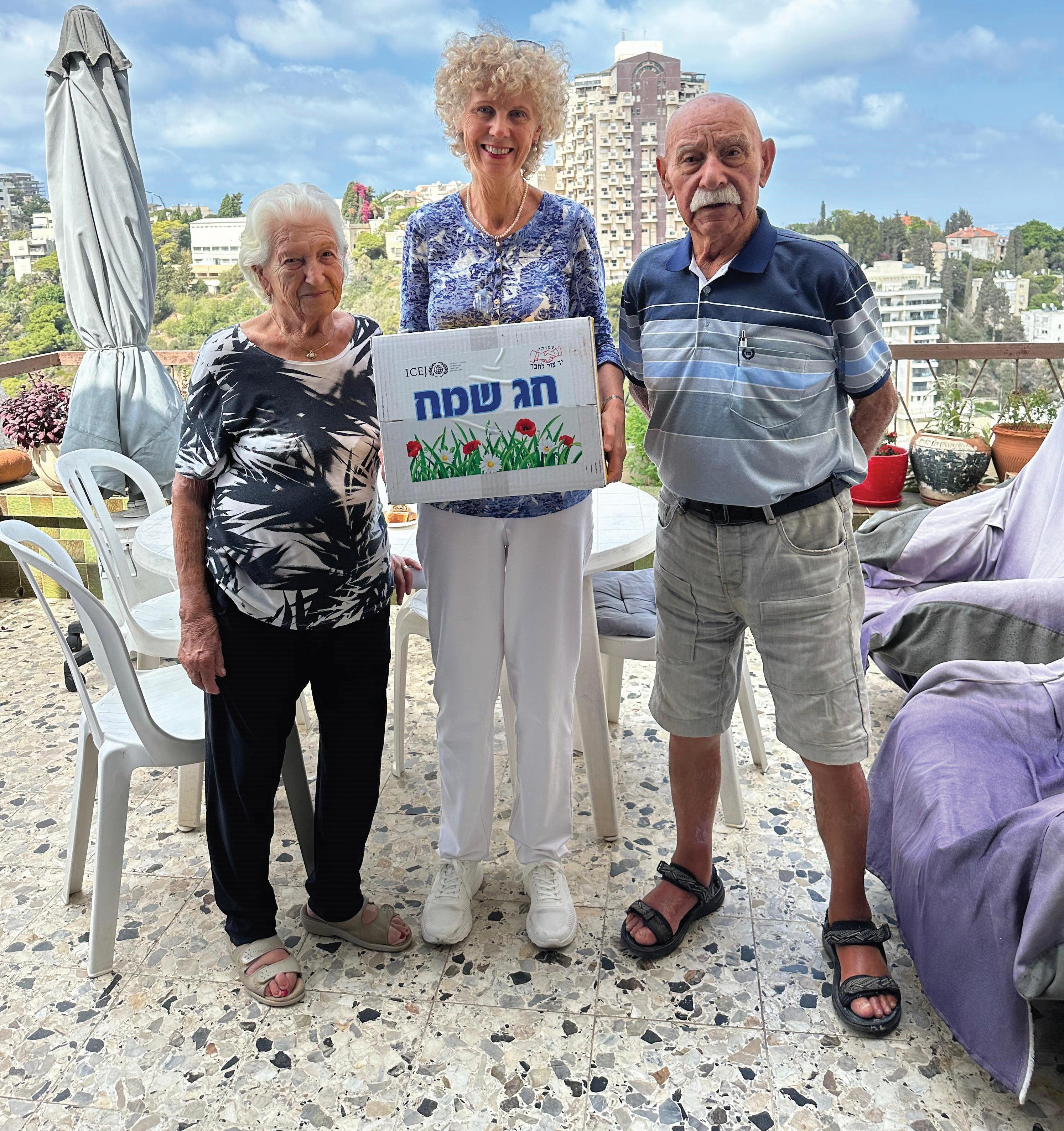
MARKING THE AT THE HAIFA HOME
Here at the ICEJ’s special Home for Holocaust survivors in Haifa, the fall High Holy Days arrived recently just as news emerged that the war in Gaza may be winding down. The weather was quickly changing to autumn. Many Israelis were preparing spiritually and practically for the solemn Day of Atonement, or Yom Kippur. Many charitable organisations were reaching out with food parcels for those who are struggling.
Our ICEJ team at the Haifa Home also reached out to Holocaust survivors in the region who still live in their own homes, blessing them with food parcels for the fall holidays. Many of these elderly people are lonely, coping with health challenges, and often do not have children nearby to support them. It is always a great privilege and joy to visit them.
Gershom (95) and Shoshana (90), both born in Romania, welcomed us with joy. Gershom, who survived three years in Transnistria, kept repeating how happy he is to be in the Jewish homeland.
High Holidays
BY YUDIT SETZ
conversation, Gershom said again and again, “This surprise visit was such a blessing to us. That doesn’t happen a lot.”
Though walking is difficult for him, he insisted on escorting us all the way back to the car. He carefully made his way down several steps and only turned back when we disappeared around the corner driving off. Our food parcel was greatly appreciated, but what touched them most was the care and love behind it.

“Israel is the most beautiful country in the world”, he insisted.
Both of their faces lit up as they invited us in for coffee. At the end of a pleasant
Yaacov, born in Lithuania, was equally moved by our unexpected visit. After we sat down, he opened his heart about how much his health has declined in recent months and how lonely he often feels. Now frail, walking only with the help of a cane, he has lost weight and rarely leaves home except for medical appointments. His children visit weekly, but he spends many days alone. For him, our visit was deeply meaningful, as we offered a listening ear, words of empathy and encouragement, and simple companionship that brought tears to his eyes.
thanked us for the parcel he received, while adding that he did not have enough words to express his appreciation for our spending time with him.
A NEW VEHICLE TO BROADEN HORIZONS
Our vision is gradually being realised to take our residents on short outings more frequently, helping them to step out of their homes, enjoy fresh air, and share meaningful experiences together. To make these trips more regular, we needed our own vehicle. With grateful hearts to our donors, we now have acquired a nine-seater van dedicated for this specific purpose – to expand the horizons of our Haifa Home residents. We look forward to creating new memories and moments of joy together as we plan various outings in the near future.
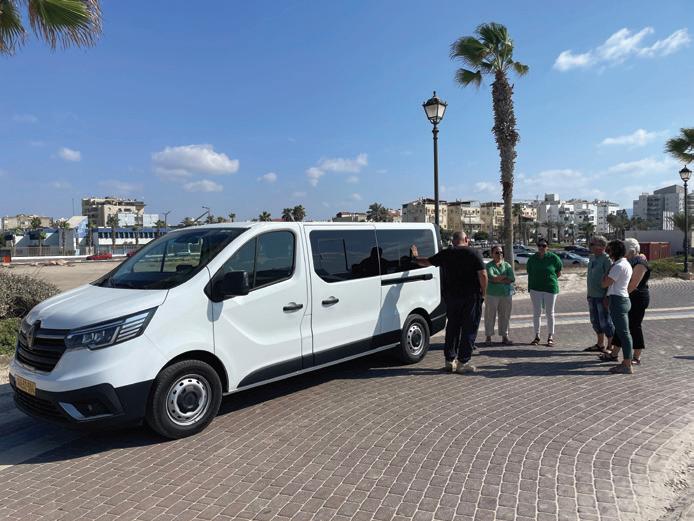
The new ICEJ Van will allow our Haifa Home residents to go on more short outings.
Yaacov
ART THAT GIVES HOPE AND LIGHT
Our first outing with the new van took us to Kfar Saba, where Nancy, our art therapist, had organised a memorable visit to a beautiful art studio. Our residents enjoyed a special art session there connected to the Rosh HaShanah holiday. Surrounded by an uplifting atmosphere—with coffee, cakes, and a festive lunch—the residents had the chance to reflect on their lives while creating artwork full of light and colour, representing hope for the Jewish New Year.
When they returned, they were still glowing from the experience.
“It’s the first time I’ve met people who do these kinds of things”, shared Dov. “I very much appreciate the beauty that was there. I just do not have words to express it.”
“I feel so nice with all the people who help us”, added Natalia. “They have such big hearts, and I truly hope that God has heard my prayers.”
“I am so happy that I came and that there was still a place in the car”, said Renate, who had not been feeling well that day. “It was great to meet people with such hearts, and the art we did fits so well with the times we are living in.”
ISRAEL, A LAND OF MIRACLES
Many of our Russian-speaking residents made Aliyah late in life and were never able to learn Hebrew or truly see the Land. Our Ukrainian residents especially, who arrived only three years ago after fleeing the Russian invasion, have also had little chance to discover this country and its incredible biblical history.
To help them connect more deeply with the Land of Israel, we invited Andrey, a tour guide and lecturer, to give a series of talks on different aspects of the Land. The residents showed great interest, eager to learn more about their new homeland. Our hope is to give them at least a glimpse of this often complex, yet truly miraculous country they now call home.
May they continue to put down roots, however small, in the Land that God promised to their
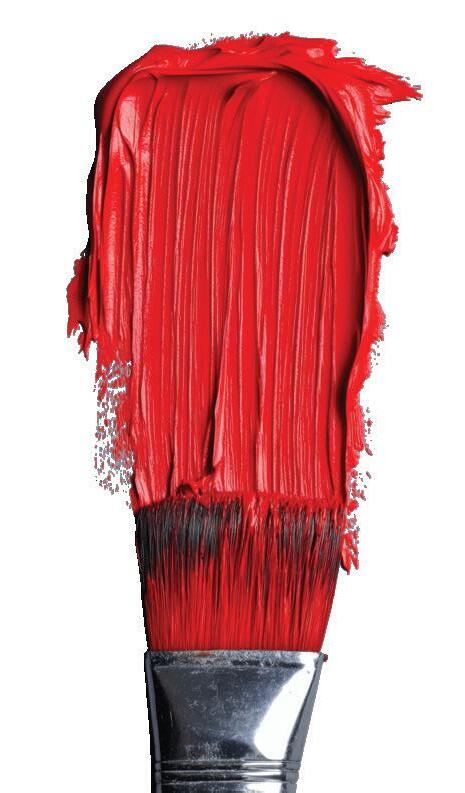
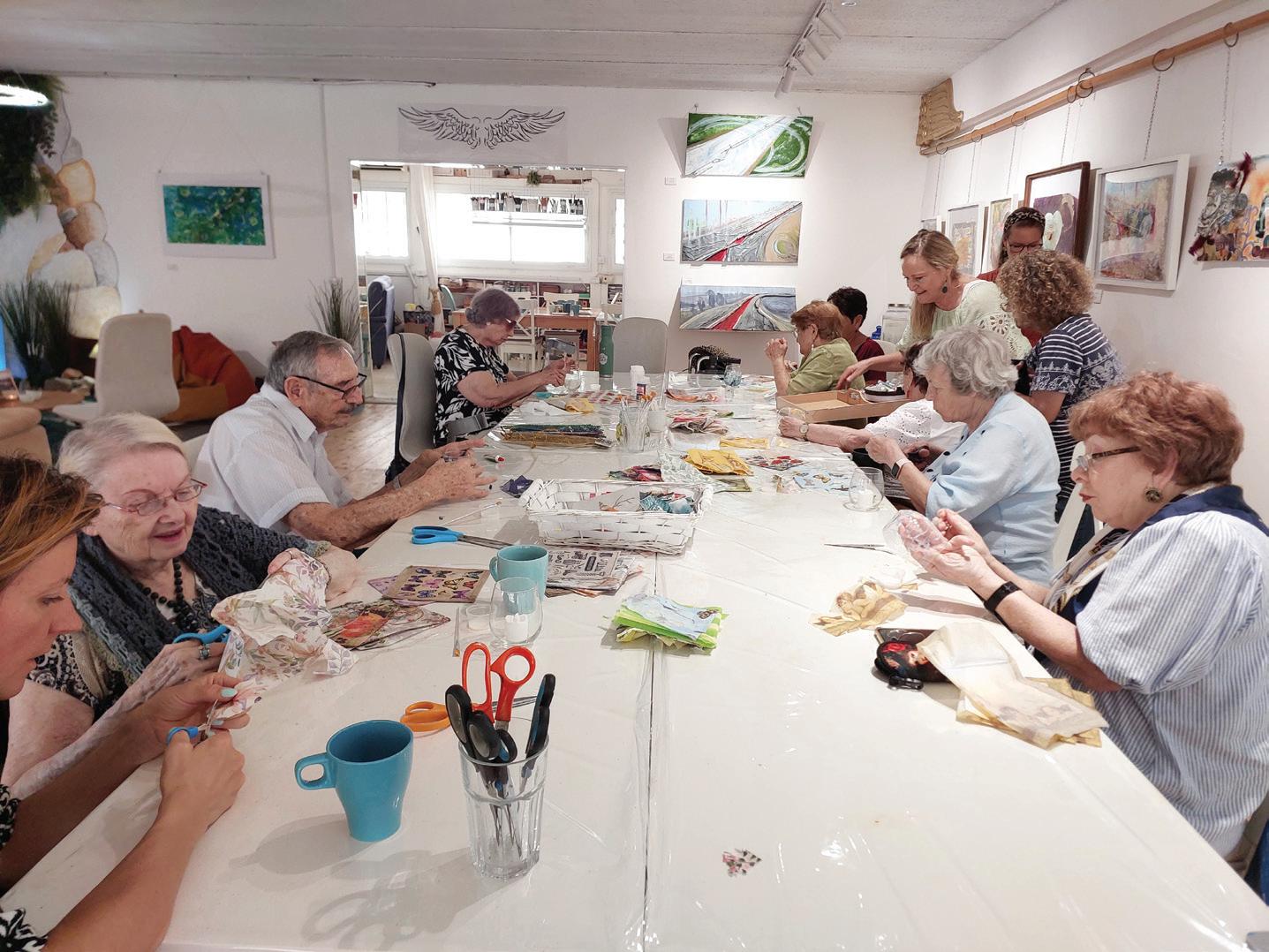
IN MEMORIAM OF FANNY SELEKOVITZ

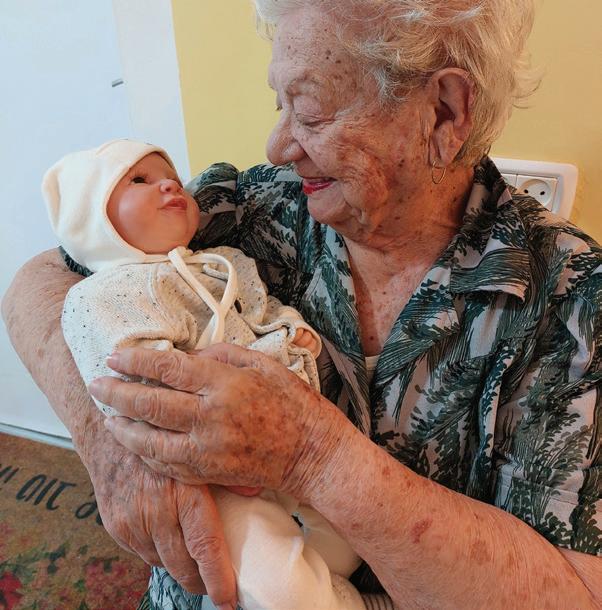

On 14 September, our dear resident Fanny Selekovitz passed away at the age of 96. We had the privilege of sharing her life for seven years at the Haifa Home. Originally from Romania, she was thrown out of school as a child for being Jewish and together with her family, suffered much. This left a mark for the rest of her life, as with every Holocaust survivor.
Fanny was a loving, active and strong woman. She loved art and had boundless creativity. Over the years, she poured her energy into crochet, painting, and many other crafts, always finding new ways to make things more
beautiful. Many visitors from abroad returned home with one of her creations, whether it was a pair of socks or another handmade treasure. In her later years, Fanny would often say, “It’s so hard to be a Jew.” Yet, almost until her final week, she continued to join our art classes, gymnastics, and nearly every activity we held. She loved our Christian staff deeply, and she will be dearly missed by all of us and by her fellow residents.
CELEBRATING ROSH HASHANAH
The Haifa Home dining room looked festive. The tables were arranged and set in a new way with colourful tablecloths, and delicious Rosh Hashanah treats were placed on the tables. Songs for the season were played and slowly our residents gathered, marking this special holiday together with our staff. We talked about the blessings of the past year, and emphasised the good things amid the very difficult situation in the Land. Every resident had the opportunity to give their New Year greeting to the rest of the people present.
It was a joyful gathering in which all the Haifa Home residents felt honoured and loved, and touched by the beauty and care that went into creating such a meaningful event. At the end everyone received a gift with a personal blessing from our staff and donors.
Visiting the art workshop in Kfar Saba.
HAIFA HOME
ICEJ-UK HOSTS ISRAEL CONFERENCE IN HEART OF LONDON
In September, the ICEJ-UK branch hosted its latest regional conference at the Kingdom Faith church in the heart of London, just a few blocks from Big Ben and the British Parliament. Host pastor Jonathan Croft is a member of our UK Board of Trustees, and along with his wife Helena oversees the Kingdom Faith fellowship, which was planted in this strategic location to raise a godly standard and intercede for the nation in the very center of this highly influential city. ICEJ Senior Vice President & Spokesman David Parsons arrived from Jerusalem to deliver a series of timely biblical messages on why Christians need to be standing with Israel in this difficult season. Later in the afternoon, hundreds of thousands of patriotic British citizens, including many Christians, took part in a massive march
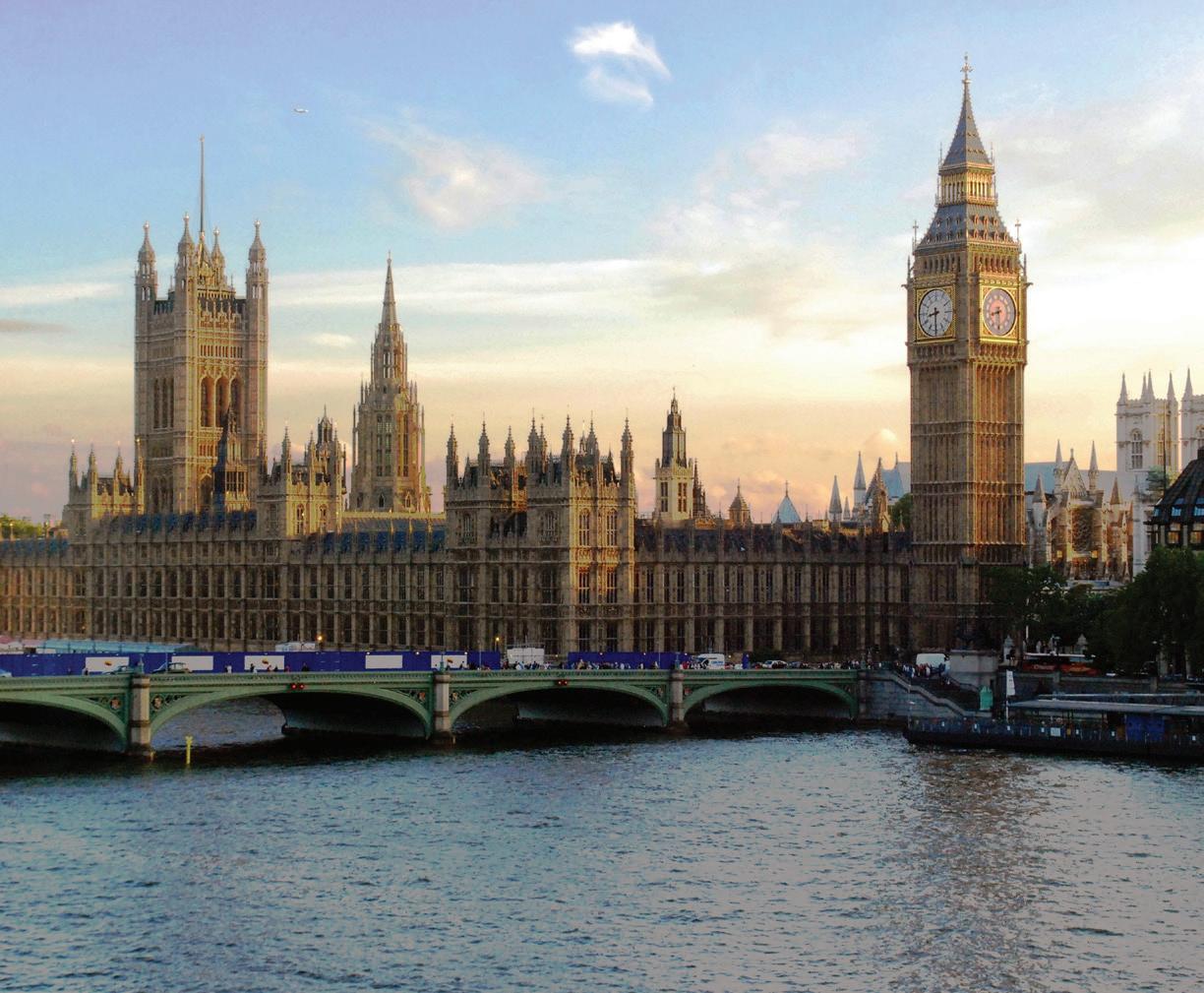
not far away, along a route where many strident anti-Israel demonstrations have been held in recent years.
ICEJ-CANADA CO-HOSTS ACTOR NATHANIEL BUZOLIC AT PRO-ISRAEL RALLY
ICEJ-Canada national director Donna Holbrook and her team recently co-hosted a rally in Toronto with Friends of JNFCanada which was headlined by Australian and Hollywood actor Nathaniel Buzolic, who has become an outspoken Christian supporter of Israel on social media.
Nate Buzz, as he is known by millions on social media, has become a prominent voice in the Christian Zionist movement, calling on Christians worldwide to stand with Israel. The popular actor is co-founder of Rova Media—an initiative launched after the October 7 massacres to combat
antisemitism and misinformation about Israel. Wanting authenticity in his reporting, he has gone beyond visiting just Israel but also has spent time in Gaza. His global advocacy videos have accumulated over 50 million views. And in May 2024, he was selected as the first non-Israeli, non-Jew to light a torch on Israel’s Independence Day.

At the Toronto rally, Nate spoke passionately and unapologetically about how Christians must take our Biblical stand with Israel and our Jewish friends. Nate also shared about his life
journey to befriending Israel… from being abandoned by his father at age two, to his Croatian-Egyptian mother, and how he grew up not knowing anyone Jewish, just Arab Muslims. Nate went searching to fill a deep void in his heart, which led him to the unsafe territory of Iraq, where God met him and eventually led him to Israel and the Jewish side he did not yet know.
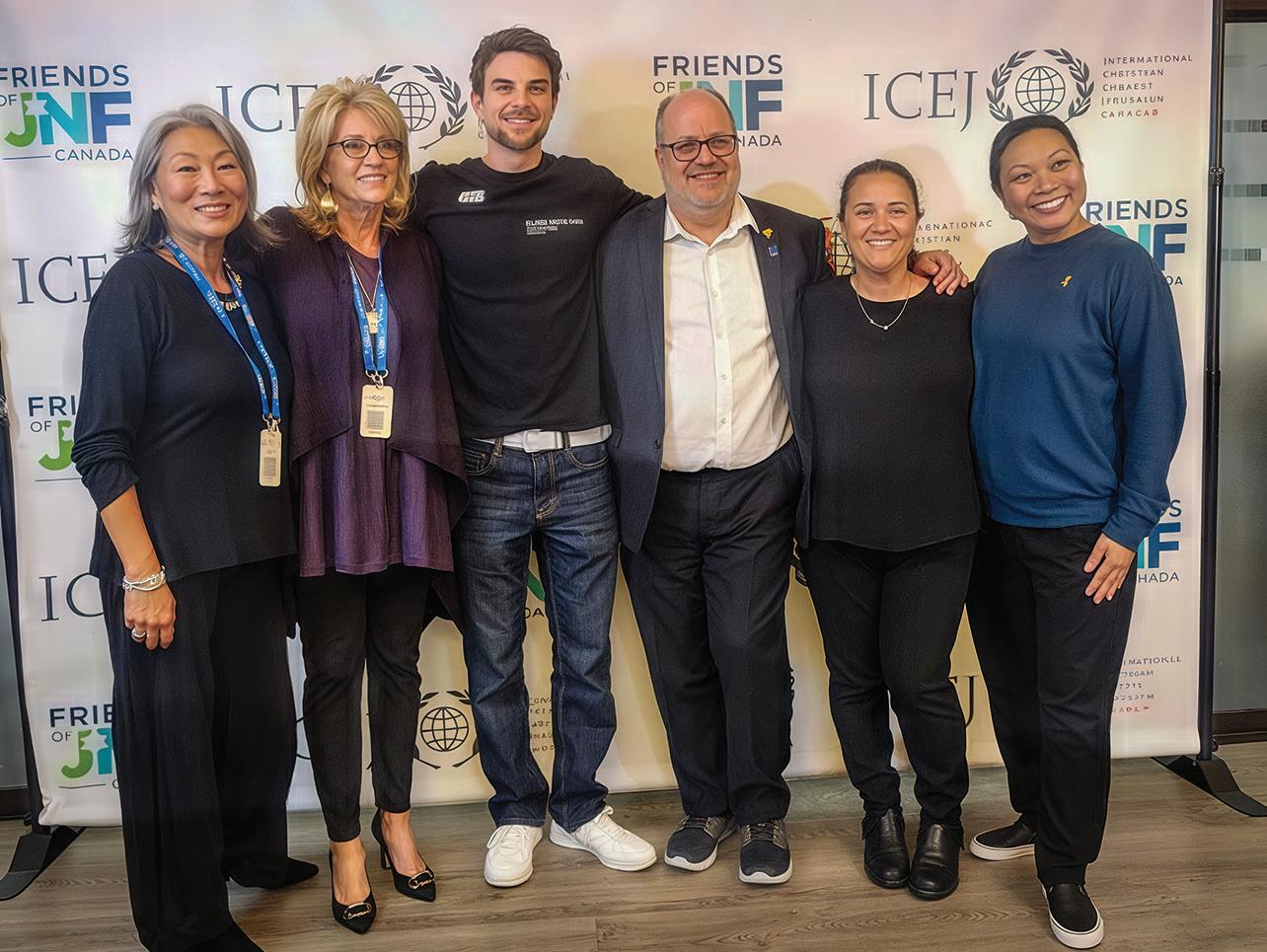
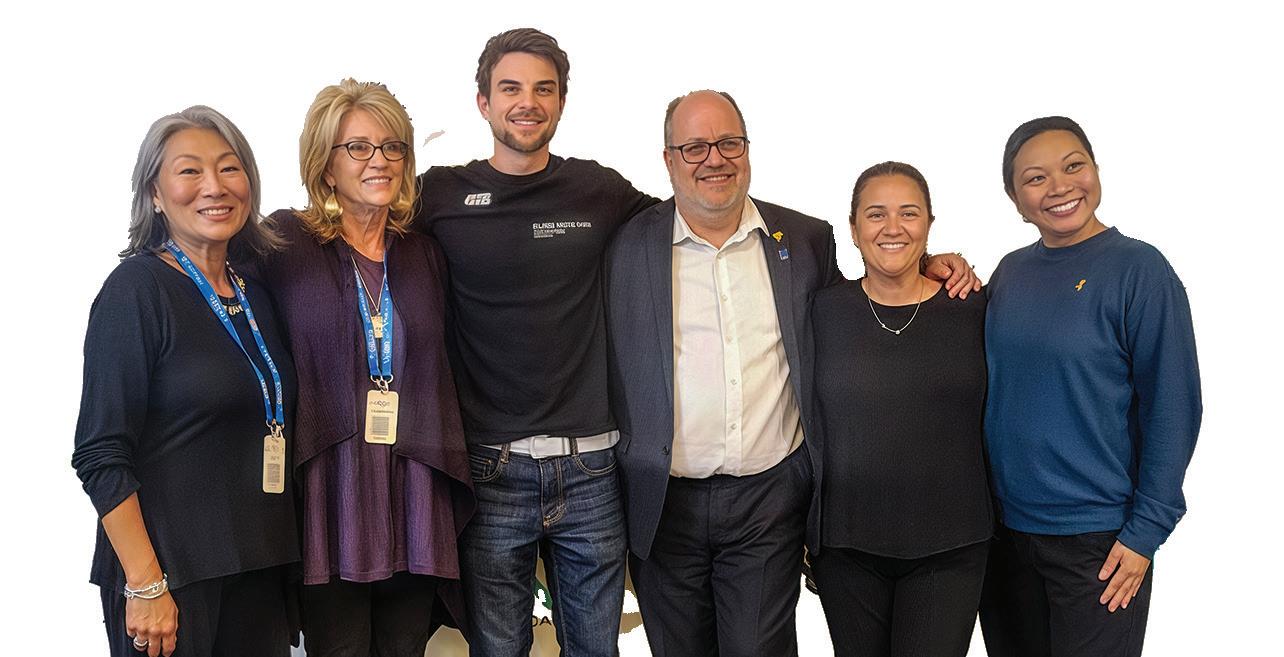
The mixed Jewish-Christian audience included a large number of young Israelis living in Toronto who were encouraged by his Christian activism for Israel and the Jewish people.
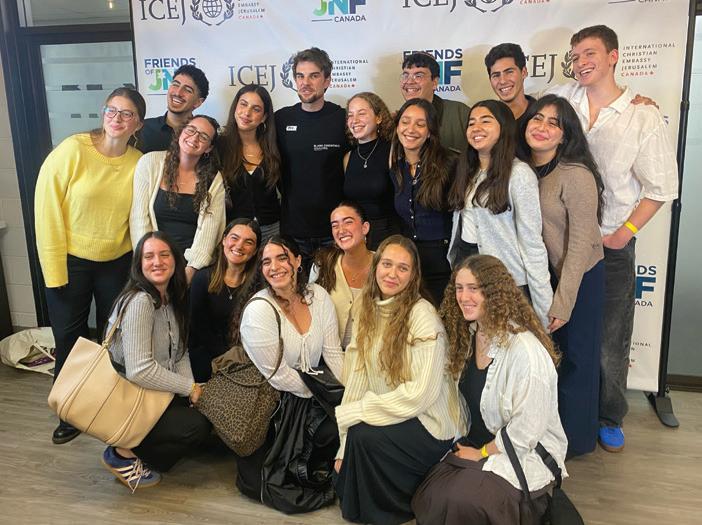
“The venue was a well-known Pentecostal church but that night it had a majority attendance from our Toronto Jewish community”, said Donna Holbrook. “Many of them had never been in a church before, but they know of our support and friendship. The evening filled our Jewish friends with hope, knowing that they are not alone.”
Nathaniel Buzolic with the main sponsors of the Toronto rally from ICEJ and Friends of JNF at a rally held in Toronto.
Big Ben and the British Parliament in London (Credit: Wkimedia Commons)
Nathaniel Buzolic with young Israelis serving in Toronto’s Jewish community.
CENTRAL AFRICAN REPUBLIC CELEBRATES THE FEAST
BY PASTOR FERMIN
When lack of visas or other obstacles hinder travel to Israel, there is no need to be discouraged. Thanks to modern technology, our nation was represented at this year’s ICEJ Feast of Tabernacles, without having to board an
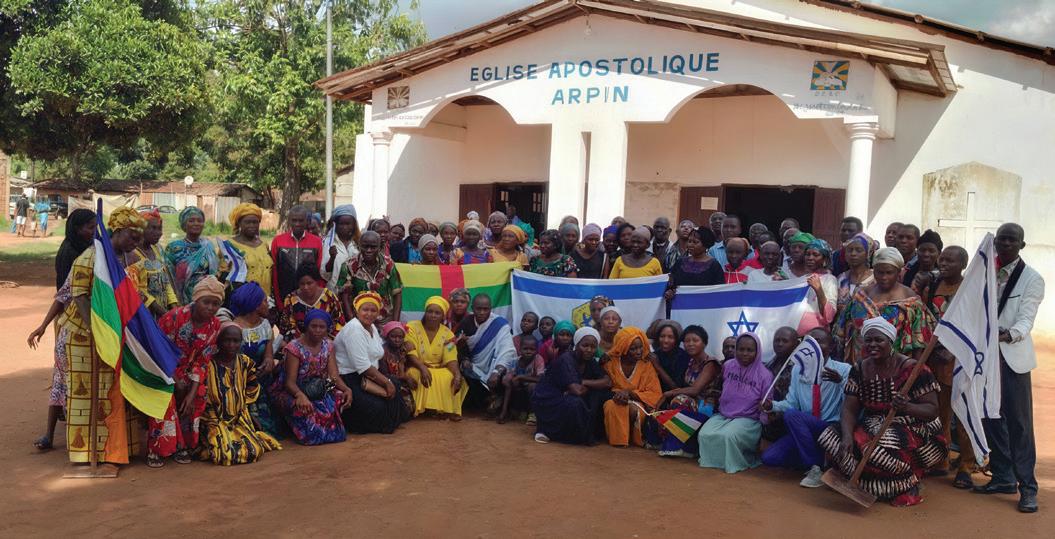
airplane. We began our Feast celebration on Sunday, 5 October with the opening service at the Arpin Apostolic Church in Bangui, the capital and largest city of the Central African Republic. Worshippers and leaders from different denominations stood alongside the gathering in Israel to honour the Lord. For the rest of the week, we continued with a live stream of the celebration in real time from the Feast venues in Jerusalem.
We were delighted to be able to organise this Feast Watch Party
ICEJ-PHILIPPINES HOLDS OCTOBER 7 MEMORIAL
BY SALLY MADDATU, ICEJ-PHILIPPINES BOARD MEMBER
Tto allow Christians here in Central Africa to follow the celebration online starting Monday, 6 October, uniting hundreds of Christians from all Evangelical backgrounds in the Central African Republic, along with many ministry leaders and pastors. We know that our nation is being blessed by this prophetic celebration. Today, we can honestly say that we have heard the call of God to the nations, including our own country. We give glory to the Lord for being there alongside Israel in this significant celebration from Deuteronomy 16:16 and Zechariah 8:23.
We continued at the Arpin church throughout the week until Monday, 13 October, when we concluded with a thanksgiving service and a family meal for all participants, organised and funded by our ICEJ-CAR branch. I am very happy to give thanks to the Lord for allowing our Central African Republic team to feel associated with the main Feast of Tabernacles celebration in Jerusalem this year by being connected online.

GERMAN CHRISTIANS JOIN MASS PRAYER RALLY FOR ISRAEL
Around 1,000 German Christians recently took part in a mass prayer rally for Israel, the Middle East, and local Jewish communities, which was held at the Münsterplatz in the city of Ulm, in southern Germany. Members of the regional Jewish community and various other Jewish and Christian organisations took part in the solidarity and prayer event arranged the German branch of the International Christian Embassy Jerusalem. Bestselling Israeli author Alon Penzel was welcomed as the guest of honor.

he ICEJ-Philippines branch recently sponsored, with support from nine other Christian Zionist organisations, a memorial event in Manila to remember the 1,200 victims of the October 7 terror invasion against Israel two years ago. Over one thousand people attended the gathering, which was held under the theme “Comfort, Comfort, My People”, from Isaiah 40:1. It was a night of many “firsts”. This was the first Christian event attended by the new Israeli Ambassador to the Philippines, Her Excellency Dana Kursh. It also was the first known time that a rabbi blew the shofar in a Christian gathering in a Christian church in the Philippines. In addition, it was the first time that the president of the local B’nai B’rith chapter prayed the She’ma in a Christian event. Finally, it was the first time that the president of the local Jewish community delivered a message in a Christian auditorium. His greeting included a warm expression of heartfelt gratitude on behalf of the Jewish community for all the Christians who have offered love and prayers, and taken a firm stand with Israel, which helps them feel that they are not alone. One other highlight was the candlelighting ceremony led by Bishop Vince Javier, founder of Jesus Reigns Ministries, which contained a blend of mourning over October 7 and rejoicing in the Lord over Israel’s victory.
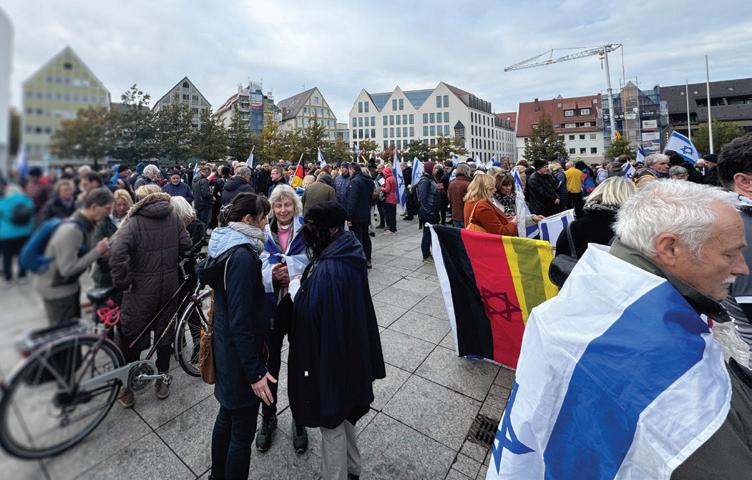
German Christians at a prayer rally in the city of Ulm, in southern Germany.
The candle-lighting ceremony led by Bishop Vince Javier.
Israeli Ambassador to the Philippines, Her Excellency Dana Kursh.
ICEJ HOMECARE SHINES LIGHT AMID DARKNESS STORIES OF COURAGE, FAITH
AND RESILIENCE DURING HANUKKAH
BY MAXINE CARLILL
The delightful festival of Hanukkah takes place for eight days during December, with candles glowing on windowsills or even outdoors.
Donuts called “sufganiyot” are cooked in oil – a fun way to remember “the miracle of the oil”. Following the Maccabean defeat of the Seleucid Greeks, a day’s worth of oil in the Menorah lasted for the eight days needed to rededicate the Temple.
A central aspect of Hanukkah is celebrating this remarkable defeat of an evil tyrant which had oppressed the Jewish faith. ‘The few over the many’ is a phrase that describes this victory, with the “few” including the God of Israel.
After two years of the current war, ICEJ Homecare has learned much about the bravery of the weak and vulnerable as we assist elderly Israeli immigrants needing our care.
In 1990, Natasha* made Aliyah from the Soviet Union with her mother, husband and son. They travelled by boat from communist Leningrad to Helsinki and then on to Israel by plane. Natasha completed her education in Israel amid many struggles and earned a doctorate in Russian literature, finding work as a teacher. Recently, she reflected on the war in Gaza with Homecare nurse Corrie van Maanen.
“The beginning was the hardest, the unknown, not feeling safe and great fear”, she recalled.
She recounted that back in Russia, threats of pogroms against Jews were resurfacing in the 1980s. So, Natasha and her family immigrated to Israel. But the images of Hamas attacks on October 7 triggered a terrible fear, especially as her husband had to go
to work, leaving her, their only son and her very elderly mother alone. Their home was close to Arab towns. Then the next day, her son was called to the Israeli army.
The day after, she wrote to her students to check if they were all safe. However, one student soon discovered her sister had been taken hostage into Gaza. Natasha did all she could to alert the world to the plight of the hostage sister on social media. It spread like a ripple in water. After more than a year, the girl was set free.
“The whole day the telephone rang even though it was on a Shabbat. I was busy thanking all the people on my social media groups”, she explained.
Although not religious herself, Natasha is aware of the power of prayer – of feeling relief, joy and thankfulness to God.
Natasha also opened her home to an evacuated young woman from Ashkelon, and together they started buying items for IDF soldiers.
“It helped me to reach out to others, whether it was writing on social media or buying things for the soldiers”, she said. “As long as I could do something for the situation we are in, I felt less fear, less stress.”
For many elderly Holocaust survivors, October 7 and the ensuing war meant reliving the horrific darkness of World War II. Some overcame the trauma by simply shutting off the news. However, one elderly lady was obsessed with watching the news and depression soon followed. But Corrie challenged this dear observant Jewish woman to read the Torah, Psalms and Prophets after every hour of watching news.
“I don’t need the news so much anymore, as the Torah is teaching me about the times we are living in”, she later told Corrie.
Other Homecare patients struggle knowing their children or grandchildren are in the IDF defending the country. One lady, a Holocaust survivor, is very fragile due to age and health issues.
“One time when I visited her, she was in tears”, Corrie recounted. “The lady said, ‘My grandson doesn’t want to tell me where he is in the army, to protect his babushka (grandmother).’ But one time he came home and told her about an accident and the miraculous way the God of Israel saved his life and those of his fellow soldiers. She told me, ‘I cry when I think of it, and when I tell others, I can’t stop crying at how God saved his life.’”
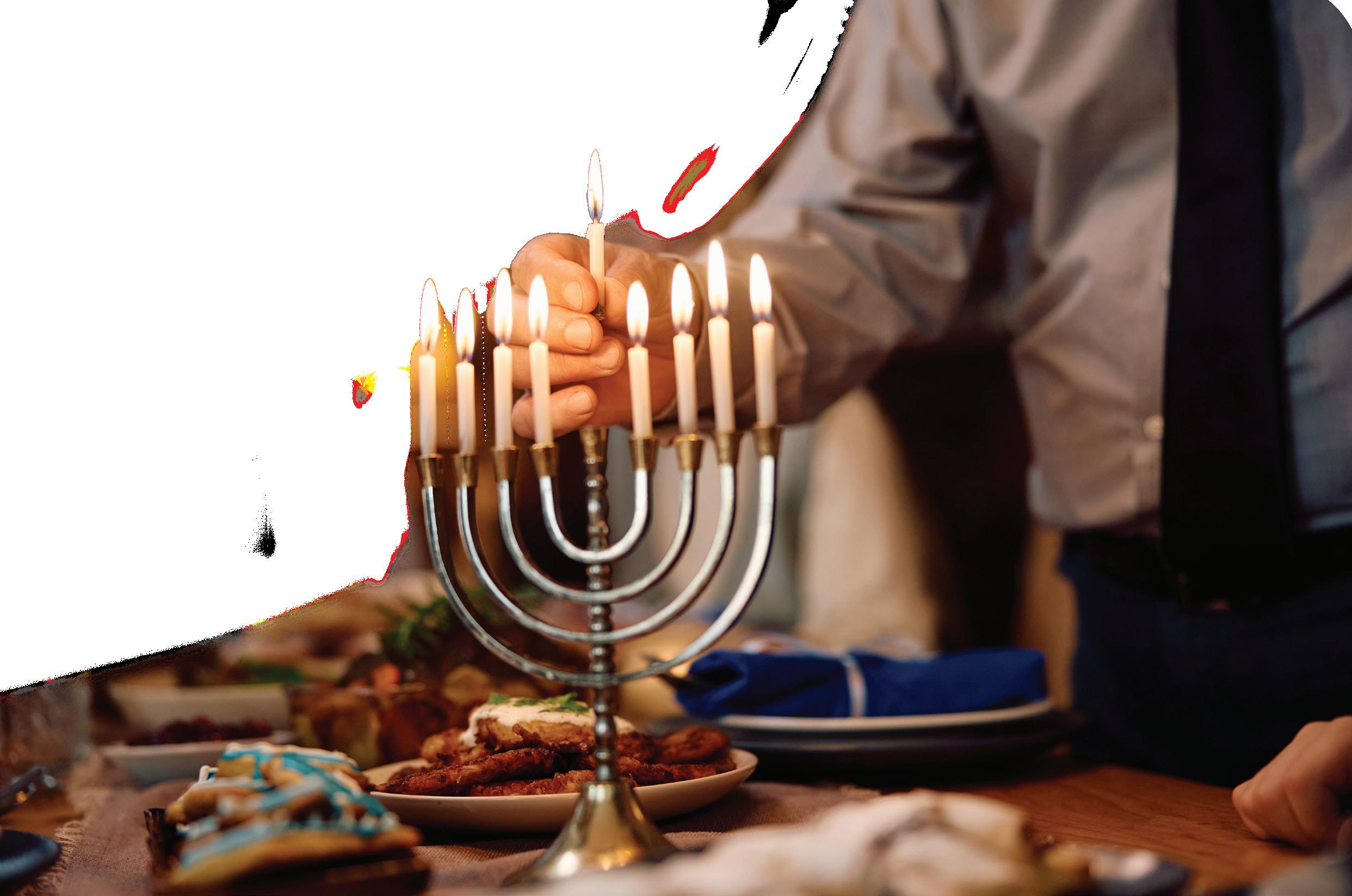
Some of these dear Russian-speaking Jews still have family caught in the war in Ukraine, and at times they are at the end of their strength. Homecare’s weekly visits bring hope, often just by being there, listening, and encouraging them. Like the candles of Hanukkah, faith overcomes darkness.
Thank you for being part of these difficult two years for those under our care. With your help, Homecare has comforted many elderly Jews in Israel.
The lighting of a Hanukkiah during the festival of lights.

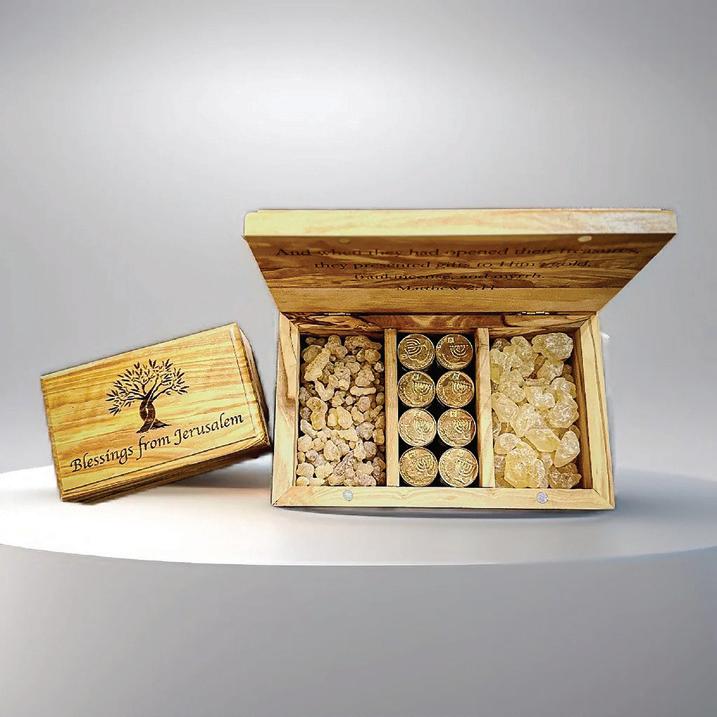
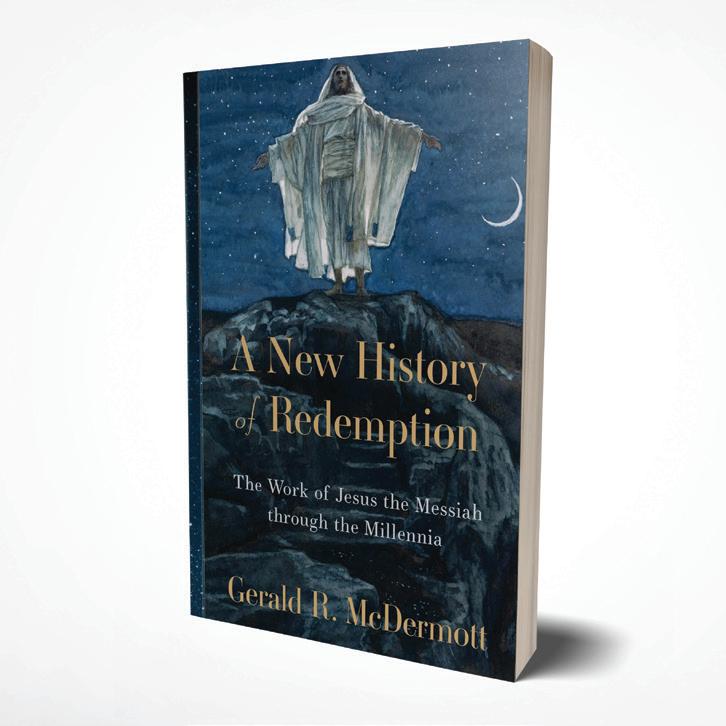


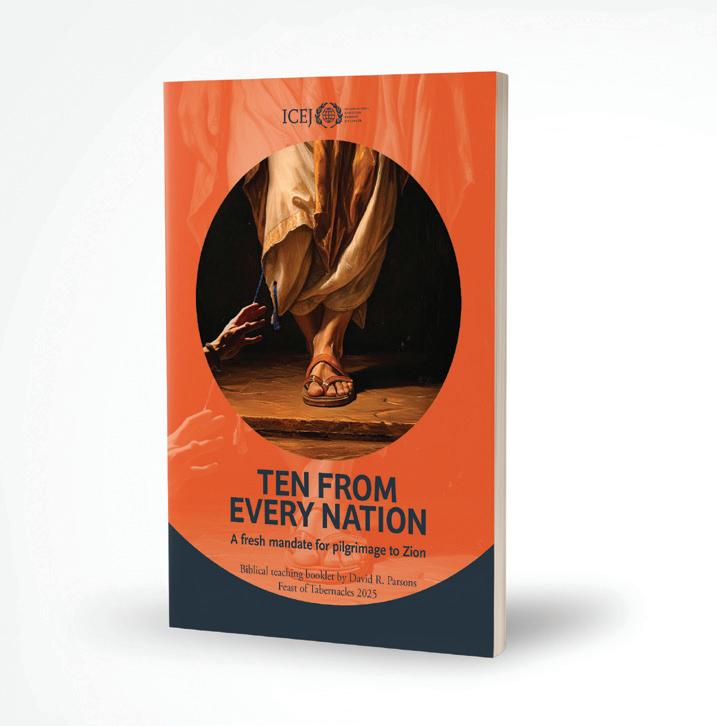
OUR ONLINE STORE AND RECEIVE A 10% DISCOUNT ON ALL PURCHASES!
Go to: ICEJSTORE.COM and use the discount code: 2025WFJICEJ – The special 10% discount for your purchases at Embassy Resources is valid throughout 2025.

